Capitalism

資本主義
Capitalism

池田光穂
★資本主義は[我々の欲望に直接訴えてくる分だけ]我々の想像以上にタフでレジリエントである——垂水源之介(1998)
★資本主義(英語ウィキペディア)は、生産手段の私的所有を基盤とする経済システムである。これは一般的に、利益の道徳的許容性、自由貿易、資本の蓄積、自発的な交換、賃金労働な どを含むものと解釈されている。現代の資本主義は、16世紀から18世紀にかけてイギリスで農業社会から発展し、ヨーロッパ各地で重商主義的実践を経て形 成された。18世紀の産業革命は、工場と複雑な分業を特徴とする資本主義を主要な生産方法として確立した。その出現、進化、普及は、広範な研究と議論の対 象となっている。多少、日本語ウィキペディアでは「資本主義または資本制は、 貿易と産業が、国政よりも営利目的の個人的所有者たちによって制御されている経済的・政治的システム。特に近現代の資本主義の根幹は、自由資本主義・リベ ラルキャピタリズムと呼ばれており、資本主義を肯定・擁護・推進する思想や主張は、普通は自由主義とされる。資本主義に基づく社会は「資本主義社会」「市 民社会」「近代社会」「ブルジョア社会」などと呼ばれる」とある。
★ここでいう資本主義は産業資本主義(Industrial capitalism)を考える
|
産業資本(さ んぎょうしほん、industrial capital、ドイツ語: industrielles Kapital)とは、18世紀後半から19世紀前半にかけての産業革命の結果成立した資本主義的生産の基軸となる資本形態のことであり、主たる資産が産 業設備である資本のこと、また、産業とくに工業を基盤とする営利企業のことをいう[1]。製造業や鉱業、物流業などにおける資本がそれにあたり、その流通 過程より利潤を獲得する。産業資本は、近代に独自の資本形態である[2]。 18 世紀末に紡績機械の改良をきっかけとして、イギリスでは新興の木綿工業が飛躍的に発展した[3]。これが産業革命のはじまりである。産業資本は、この産業 革命により登場した資本形態であり、それに先立つ商業資本や高利貸資本とは異なり、生産過程をその内部にもつ[2]。産業資本成立のためには、農民から土 地を収奪し、彼らを生産手段をもたない労働者階級に転化する「資本の本源的蓄積」のプロセスが歴史的に先行しなければならない。産業資本が近代に独自の資 本形態とされるのは、そのためである[2]。イギリスでは、1830年前後には、蒸気機関や紡績機、綿布機械などが発明・改良されて工場制度の下に大生産 がおこなわれ、資本家が多数の労働者を雇用して一定の規律のもとに労働させるシステム(資本制的生産様式、あるいは単に資本主義)が形成されていった [3]。 G - W ... P ... W' - G' マ ルクス経済学の説明では、生産資本の活動は、まず貨幣形態(G)で投下され、それによって生産手段(産業設備、土地など)と労働力商品(商品としての労働 力)が購入され、賃金によって労働者を働かせ、機械等の産業設備を稼動させる(生産過程Pを進行させる)ことによって剰余価値を内包する商品(W')を生 産し、それを流通させ、最終的に販売することによって利潤を上げる[2]。すなわち、価値はこの過程で増殖するのであり、利潤の源泉は商品生産過程におい て生じた剰余価値ということになる。こうして、賃労働と資本の結合によって生まれた利潤は、さらに新たな生産手段の獲得のために再投資され、生産活動と利 潤の拡張を自己目的として、これら全体の営為が繰り返される[2]。産業革命当初に形成された産業資本は、初期投資の額が比較的軽微ですむ繊維工業などの 軽工業分野の資本であった。それがやがて、製鉄業、機械工業、鉱業、鉄道建設などに拡大されるにつれ、それぞれの分野において産業資本が生まれた。 歴 史的にみれば、先行して成立した商業資本(G―W―G')や高利貸資本(G…G')は、産業資本の成立とともに、これに従属し、以後は産業資本の部分的機 能を代行するのみの従属的な役割を果たすだけになった[2]。産業資本はまた、先行するギルド組織が商工業者の自治理念に発しながら自己の組織・利害を守 ること自体を目的としたのに対し、それが資本制的システムの自由な展開にとって障害となってきたところから、「営業の自由(freedom of trade)」を主張した[1][注釈 1]。それが、アダム・スミスの『諸国民の富』(国富論)で主張されるところの「経済における自由放任主義」(自由主義経済)である。スミスの唱えた経済 学は自由競争時代の産業資本家の利益を代弁するものであった。そしてまた、「営業の自由(freedom of trade)」は、やがて「自由貿易(free trade)」の主張となっていく[1][注釈 2]。 産業資本が成長し、規模の拡大や多業種への活動拡大に金融資本が関与するようになると、資本主義は独占資本が一国のほとんど全産業を支配する独占資本主義の段階へと移り、国際政治のうえでは、列強によって帝国主義の政策が採られるようになった(→「産業資本」)。 |
☆呼称の起源
資本主義(capitalism)という用語は誰が 使い始めたのか? カール・マルクス(Karl Marx, 1818-1883)か?どうも、マルクスやその盟友フリードリヒ・エンゲルス(Friedrich Engels, 1820-1895)ではないようだ。『資本論(Das Capital)』も第1巻は1867年にマルクスの生前に発刊されたが、この書物のもともとのタイトルは『経済学批判(1857-1858; 1858-1859)』であり、その表題は副題として残っている。第2巻は、マルクスの死後2年後の1885年に、第3巻はエンゲルスがなくなる1年前の 1894年に刊行された。実質的に2巻以降は、マルクスとエンゲルスの共著であるといってもよい。第4巻は資本論のタイトルがなく、それをまとめたカー ル・カウツキーらにより『剰余価値学説史』(1905-1910)となって20世紀になってようやく完成をみた(→「資本主義批判」)。
マルクスらが依拠したり、また批判して論敵とした、 ルイ・ブラン(Louis Blanc, 1811-1882)が資本主義を 「ある者が他者を締め出す事による、資本の占有」の状態を1850年にその ように呼んだようだ。フランス語では資本主義は1753年には商品を所有する人の意味ですでに使われていたそうだ。ピエール・ジョゼフ・プルードン(Pierre Joseph Proudhon, 1809-1865)は、フェルナン・ブローデルの説によると資本主義の体制のもとでは労働する者は資本を持たないと説明している。『資本論』の中では、 資本家のシステムないしは、本家の生産様式などと表現されていて、彼らが批判してやまない制度を資本主義とは呼ばなかったようだ。『資本論』第2巻では、 資本主義はわずか1度だけしかでてこない(ドイツ語のウィキペディアKapitalismusよ り)。日本語のウィキペディアも、資本主義とマルクスらの関係については曖昧なままの説明に終わっている。
20世紀になると、ヴェルナー・ゾンバルトがDer moderne Kapitalismus (1902) を、マックス・ウェーバーがDie protestantische Ethik und der Geist des Kapitalismus (1904).を書名のタイトルに採用してから、資本主義は人口に膾炙するようになるとみてもよいので資本論からはほぼ30年ちかくの歳月がかかっている ことになる。
では資本主義とはなにか?マルクス主義が思想界を席 巻した1970−80年代に書かれたと思われるコトバンクだとこう説明されている;「生産手段を資本として私有する資本家が、自己の労働力以外に売るもの を持たない労働者から労働力を商品として買い、それを上回る価値を持つ商品を生産して利潤を得る経済構造」。ここで「上回る価値を持つ商品を生産」という ところが、マルクスやエンゲルスのいうところの剰余価値労働によって、上前を刎ねられて「搾取」されているお馴染みの図式が想定されている。だがはっきり 言おう、これは資本主義のメカニズム分析に立ち入ってかつ不正確な説明である。そのため、資本主義のミニマックスの定義が必要である。つまり、資本主義と は「(リアルやヴァーチャルを問わず)会社や商店が労働者を働かせて利潤のあげ、そ れ(=労働の結果や成果)を給料という対価を支払い、それで回っている世の中のしくみ」 ということだ。市場や「自由」の概念というものは、そのような世の中のしくみ、からうまれてくる必然あるいは「改良されて一定の均衡安定を得たもの」とい うことがある。その意味で、市場が国家をコントロールし、市民が享受すべき自由などなくても資本主義を回せるという中国共産党の改革開放政策以降の中華人 民共和国も、資本主義国なのである。
| Capitalism
is an economic system based on the private ownership of the means of
production and their operation for profit.[1][2][3][4][5] Central
characteristics of capitalism include capital accumulation, competitive
markets, price systems, private property, property rights recognition,
economic freedom, profit motive, commodification, voluntary exchange,
wage labor and the production of commodities.[6][7][8][9] In a market
economy, decision-making and investments are determined by owners of
wealth, property, or ability to maneuver capital or production ability
in capital and financial markets—whereas prices and the distribution of
goods and services are mainly determined by competition in goods and
services markets.[10] Economists, historians, political economists, and sociologists have adopted different perspectives in their analyses of capitalism and have recognized various forms of it in practice. These include laissez-faire or free-market capitalism, anarcho-capitalism, state capitalism, and welfare capitalism. Different forms of capitalism feature varying degrees of free markets, public ownership,[11] obstacles to free competition, and state-sanctioned social policies. The degree of competition in markets and the role of intervention and regulation, as well as the scope of state ownership, vary across different models of capitalism.[12][13] The extent to which different markets are free and the rules defining private property are matters of politics and policy. Most of the existing capitalist economies are mixed economies that combine elements of free markets with state intervention and in some cases economic planning.[14] Capitalism in its modern form emerged from agrarianism in England, as well as mercantilist practices by European countries between the 16th and 18th centuries. The Industrial Revolution of the 18th century established capitalism as a dominant mode of production, characterized by factory work and a complex division of labor. Through the process of globalization, capitalism spread across the world in the 19th and 20th centuries, especially before World War I and after the end of the Cold War. During the 19th century, capitalism was largely unregulated by the state, but became more regulated in the post–World War II period through Keynesianism, followed by a return of more unregulated capitalism starting in the 1980s through neoliberalism. Market economies have existed under many forms of government and in many different times, places, and cultures. Modern industrial capitalist societies developed in Western Europe in a process that led to the Industrial Revolution. Capitalist economies promote economic growth through accumulation of capital, however a business cycle of economic growth followed by recession is a common characteristic of such economies.[15] |
資本主義(しほんしゅぎ、英:
Capitalism)とは、生産手段の私有と営利を目的としたその運用に基づく経済体制である[1][2][3][4][5]。資本主義の中心的な特徴
として、資本蓄積、競争市場、価格システム、私有財産、財産権の承認、経済的自由、利潤動機、商品化、自発的交換、賃金労働、商品生産などが挙げられる。
[6][7][8][9]市場経済においては、意思決定と投資は、富、財産、または資本市場や金融市場における資本や生産能力を操縦する能力の所有者に
よって決定され、一方、財やサービスの価格と分配は、主に財やサービス市場における競争によって決定される[10]。 経済学者、歴史家、政治経済学者、社会学者は、資本主義の分析において異なる視点を採用し、実際において資本主義の様々な形態を認めてきた。これらには、 自由放任または自由市場資本主義、無政府資本主義、国家資本主義、福祉資本主義が含まれる。資本主義のさまざまな形態の特徴は、自由市場、公的所有権、 [11]自由競争に対する障害、国家公認の社会政策の程度が異なることである。市場における競争の程度、介入と規制の役割、国家所有の範囲は、資本主義の 異なるモデルによって異なる[12][13]。現存する資本主義経済のほとんどは、自由市場の要素と国家の介入、場合によっては経済計画の要素を組み合わ せた混合経済である[14]。 近代的な形態の資本主義は、16世紀から18世紀にかけてのヨーロッパ諸国による重商主義の実践と同様に、イギリスにおける農耕主義から生まれた。18世 紀の産業革命は、工場労働と複雑な分業を特徴とする、支配的な生産様式としての資本主義を確立した。グローバリゼーションの過程を通じて、資本主義は19 世紀から20世紀にかけて、特に第一次世界大戦前と冷戦終結後に世界中に広がった。19世紀には、資本主義は国家による規制をほとんど受けなかったが、第 二次世界大戦後のケインズ主義によって規制が強化され、その後、1980年代から新自由主義によって規制のない資本主義が復活した。 市場経済は様々な形態の政府の下で、様々な時代、場所、文化の中で存在してきた。近代産業資本主義社会は、産業革命に至る過程で西ヨーロッパで発展した。 資本主義経済は資本の蓄積を通じて経済成長を促進するが、経済成長の後に不況が訪れるという景気循環は、このような経済に共通する特徴である[15]。 |
| Etymology Other terms sometimes used for capitalism: Capitalist mode of production[16] Economic liberalism[17] Free enterprise[18][page needed] Free enterprise economy[19] Free market[18][page needed] Free market economy[19] Laissez-faire[20] Market economy[21] Profits system[22][page needed] Self-regulating market[18][page needed] The term "capitalist", meaning an owner of capital, appears earlier than the term "capitalism" and dates to the mid-17th century. "Capitalism" is derived from capital, which evolved from capitale, a late Latin word based on caput, meaning "head"—which is also the origin of "chattel" and "cattle" in the sense of movable property (only much later to refer only to livestock). Capitale emerged in the 12th to 13th centuries to refer to funds, stock of merchandise, sum of money or money carrying interest.[23]: 232 [24] By 1283, it was used in the sense of the capital assets of a trading firm and was often interchanged with other words—wealth, money, funds, goods, assets, property and so on.[23]: 233 The Hollantse (German: holländische) Mercurius uses "capitalists" in 1633 and 1654 to refer to owners of capital.[23]: 234 In French, Étienne Clavier referred to capitalistes in 1788,[25] four years before its first recorded English usage by Arthur Young in his work Travels in France (1792).[24][26] In his Principles of Political Economy and Taxation (1817), David Ricardo referred to "the capitalist" many times.[27] English poet Samuel Taylor Coleridge used "capitalist" in his work Table Talk (1823).[28] Pierre-Joseph Proudhon used the term in his first work, What is Property? (1840), to refer to the owners of capital. Benjamin Disraeli used the term in his 1845 work Sybil.[24] Alexander Hamilton used "capitalist" in his Report of Manufactures presented to the United States Congress in 1791. The initial use of the term "capitalism" in its modern sense is attributed to Louis Blanc in 1850 ("What I call 'capitalism' that is to say the appropriation of capital by some to the exclusion of others") and Pierre-Joseph Proudhon in 1861 ("Economic and social regime in which capital, the source of income, does not generally belong to those who make it work through their labor").[23]: 237 Karl Marx frequently referred to the "capital" and to the "capitalist mode of production" in Das Kapital (1867).[29][30] Marx did not use the form capitalism but instead used capital, capitalist and capitalist mode of production, which appear frequently.[30][31] Due to the word being coined by socialist critics of capitalism, economist and historian Robert Hessen stated that the term "capitalism" itself is a term of disparagement and a misnomer for economic individualism.[32] Bernard Harcourt agrees with the statement that the term is a misnomer, adding that it misleadingly suggests that there is such a thing as "capital" that inherently functions in certain ways and is governed by stable economic laws of its own.[33] In the English language, the term "capitalism" first appears, according to the Oxford English Dictionary (OED), in 1854, in the novel The Newcomes by novelist William Makepeace Thackeray, where the word meant "having ownership of capital".[34] Also according to the OED, Carl Adolph Douai, a German American socialist and abolitionist, used the term "private capitalism" in 1863. |
語源 資本主義について使われることがある他の用語 資本主義的生産様式[16] 経済自由主義[17] 自由企業主義[18][要ページ]。 自由企業経済[19] 自由市場[18][ページが必要]。 自由市場経済[19] 自由放任主義[20] 市場経済[21] プロフィット・システム[22][ページが必要]。 自主規制市場[18][ページが必要]。 資本の所有者を意味する 「capitalist 」という用語は、「capitalism 」という用語よりも古く、17世紀半ばに登場する。「資本主義」は、「頭」を意味するcaputに基づく後期ラテン語であるcapitaleから発展した capitaleが語源であり、動産という意味での「chattel」や「cattle」の語源でもある(家畜のみを指すようになったのはずっと後のこと である)。Capitaleは12世紀から13世紀にかけて、資金、商品在庫、金銭の総額、利子を伴う金銭を指すようになった[23]: 232 [24] 1283年までには、商社の資本資産の意味で使われるようになり、しばしば他の単語-富、金銭、資金、商品、資産、財産など-と交換された[23]: 233。 フランス語では、エティエンヌ・クラヴィエが1788年にcapitalistesに言及している[25]。 [24][26]デイヴィッド・リカルドは『政治経済学および課税の原理』(1817年)の中で「資本家」に何度も言及している[27]。 イギリスの詩人サミュエル・テイラー・コールリッジは『テーブル・トーク』(1823年)の中で「資本家」を使用している[28]。 ピエール=ジョゼフ・プルードンは処女作『財産とは何か』(1840年)の中で資本の所有者を指す言葉としてこの言葉を使用している。ベンジャミン・ディ ズレーリは1845年の著作『シビル』の中でこの用語を使用している[24]。アレクサンダー・ハミルトンは1791年にアメリカ合衆国議会に提出した 『製造業報告書』の中で「資本家」を使用している。 現代的な意味での「資本主義」という用語の最初の使用は、1850年のルイ・ブラン(「私が『資本主義』と呼ぶもの、すなわち、他者を排除した一部による 資本の充当」)と1861年のピエール=ジョゼフ・プルードン(「所得の源泉である資本が、労働を通じてそれを働かせる人々に一般的に帰属しない経済社会 体制」)に起因している[23]。 [29][30]マルクスは資本主義という形式を使わず、代わりに資本、資本家、資本主義的生産様式を使用したが、これらは頻繁に登場する[30] [31]。この言葉は資本主義に対する社会主義的批判者によって作られたものであるため、経済学者であり歴史家でもあるロバート・ヘッセンは、「資本主 義」という言葉自体が蔑称であり、経済的個人主義に対する誤用であると述べている。 [32]バーナード・ハーコートは、この用語が誤用であるという声明に同意し、この用語は、本質的に特定の方法で機能し、それ自体の安定した経済法則に よって支配される「資本」のようなものが存在することを誤解を招くように示唆していると付け加えている[33]。 英語では、オックスフォード英語辞典(OED)によれば、「資本主義」という用語は1854年に小説家ウィリアム・メイクピース・サッカレイの小説 『The Newcomes』の中で初めて登場し、この単語は「資本の所有権を持つこと」を意味していた[34]。 またOEDによれば、ドイツ系アメリカ人の社会主義者で奴隷廃止論者であったカール・アドルフ・ドゥーアイは、1863年に「私的資本主義」という用語を 使っていた。 |
| Definition There is no universally agreed upon definition of capitalism; it is unclear whether or not capitalism characterizes an entire society, a specific type of social order, or crucial components or elements of a society.[35] Societies officially founded in opposition to capitalism (such as the Soviet Union) have sometimes been argued to actually exhibit characteristics of capitalism.[36] Nancy Fraser describes usage of the term "capitalism" by many authors as "mainly rhetorical, functioning less as an actual concept than as a gesture toward the need for a concept".[8] Scholars who are uncritical of capitalism rarely actually use the term "capitalism".[37] Some doubt that the term "capitalism" possesses valid scientific dignity,[35] and it is generally not discussed in mainstream economics,[8] with economist Daron Acemoglu suggesting that the term "capitalism" should be abandoned entirely.[38] Consequently, understanding of the concept of capitalism tends to be heavily influenced by opponents of capitalism and by the followers and critics of Karl Marx.[37] |
定義 資本主義が社会全体を特徴づけるのか、特定のタイプの社会秩序を特徴づけるのか、あるいは社会の重要な構成要素や要素を特徴づけるのかは不明である [35]。資本主義に反対して公式に設立された社会(ソビエト連邦など)は、資本主義の特徴を実際に示していると主張されることもある[36]。ナン シー・フレイザーは、多くの著者による「資本主義」という用語の用法を「主に修辞的なものであり、概念の必要性に対するジェスチャーというよりも実際の概 念として機能している」と述べている[8]。 [資本主義に批判的でない学者は、「資本主義」という用語を実際に使用することはほとんどない[37]。 資本主義」という用語が有効な科学的品位を有していることを疑う者もおり[35]、主流派の経済学では一般的に議論されておらず[8]、経済学者のダロ ン・アセモグルは「資本主義」という用語を完全に放棄するべきだと提言している[38]。 その結果、資本主義の概念に対する理解は、資本主義の反対者やカール・マルクスの信奉者や批判者によって大きな影響を受ける傾向にある[37]。 |
| History of
capitalism |
|
| https://en.wikipedia.org/wiki/Capitalism |
★資本主義の歴史(History of Capitalism)
| Capitalism
is an economic system based on the private ownership of the means of
production. This is generally taken to imply the moral permissibility
of profit, free trade, capital accumulation, voluntary exchange, wage
labor, etc. Modern capitalism evolved from agrarianism in England and
mercantilist practices across Europe between the 16th and 18th
centuries. The 18th-century Industrial Revolution cemented capitalism
as the primary method of production, characterized by factories and a
complex division of labor. Its emergence, evolution, and spread are the
subjects of extensive research and debate. The term "capitalism" in its modern sense emerged in the mid-19th century, with thinkers like Louis Blanc and Pierre-Joseph Proudhon coining the term to describe an economic and social order where capital is owned by some and not others who labor. Karl Marx discussed "capital" and the "capitalist mode of production" extensively in Das Kapital (1867). Some historians argue that the roots of modern capitalism lie in the "crisis of the Late Middle Ages," a period of conflict between the aristocracy and agricultural workers. This system differs from earlier forms of trade by focusing on surplus value from production rather than simply "buying cheap and selling dear." Conceptions of capitalism have evolved significantly over time, influenced by various political and analytical viewpoints. Debates sometimes focus on how to bring substantive historical data to bear on key questions.[1] Key parameters of debate include: the extent to which capitalism is natural, versus the extent to which it arises from specific historical circumstances; whether its origins lie in towns and trade or in rural property relations; the role of class conflict; the role of the state; the extent to which capitalism is a distinctively European innovation; its relationship with European imperialism; whether technological change is a driver or merely a secondary byproduct of capitalism; and whether or not it is the most beneficial way to organize human societies.[2] |
資本主義は、生産手段の私的所有を基盤とする経済システムである。これ
は一般的に、利益の道徳的許容性、自由貿易、資本の蓄積、自発的な交換、賃金労働などを含むものと解釈されている。現代の資本主義は、16世紀から18世
紀にかけてイギリスで農業社会から発展し、ヨーロッパ各地で重商主義的実践を経て形成された。18世紀の産業革命は、工場と複雑な分業を特徴とする資本主
義を主要な生産方法として確立した。その出現、進化、普及は、広範な研究と議論の対象となっている。 「資本主義」という用語は、19世紀半ばにルイ・ブランやピエール=ジョゼフ・プルードンといった思想家によって、資本が一部の者によって所有され、労働 する他の者には所有されない経済的・社会的秩序を形容するために造語された。カール・マルクスは『資本論』(1867年)で「資本」と「資本主義的生産方 式」を詳細に論じた。 一部の歴史家は、現代資本主義の根源は「中世後期の危機」にあると主張しています。これは、貴族と農業労働者との間の対立の時代です。このシステムは、生 産からの剰余価値に焦点を当てる点で、単に「安く買って高く売る」という以前の貿易形態と異なります。資本主義の概念は、時間とともに大きく進化してきま した。これは、多様な政治的・分析的視点に影響を受けています。議論は、重要な問題に実質的な歴史的データをどう適用するかに焦点を当てることもありま す。[1] 議論の主要なパラメーターには、次のようなものがある:資本主義が自然なものか、それとも特定の歴史的状況から生じたものか;その起源が都市と貿易にある のか、それとも農村部の財産関係にあるのか; 階級闘争の役割;国家の役割;資本主義がヨーロッパ特有の革新である程度;ヨーロッパ帝国主義との関係;技術的変化が資本主義の駆動要因か、単なる二次的 な副産物か;そして、それが人類社会を組織する最も有益な方法であるかどうか。[2] |
| Agrarian capitalism Crisis of the 14th century 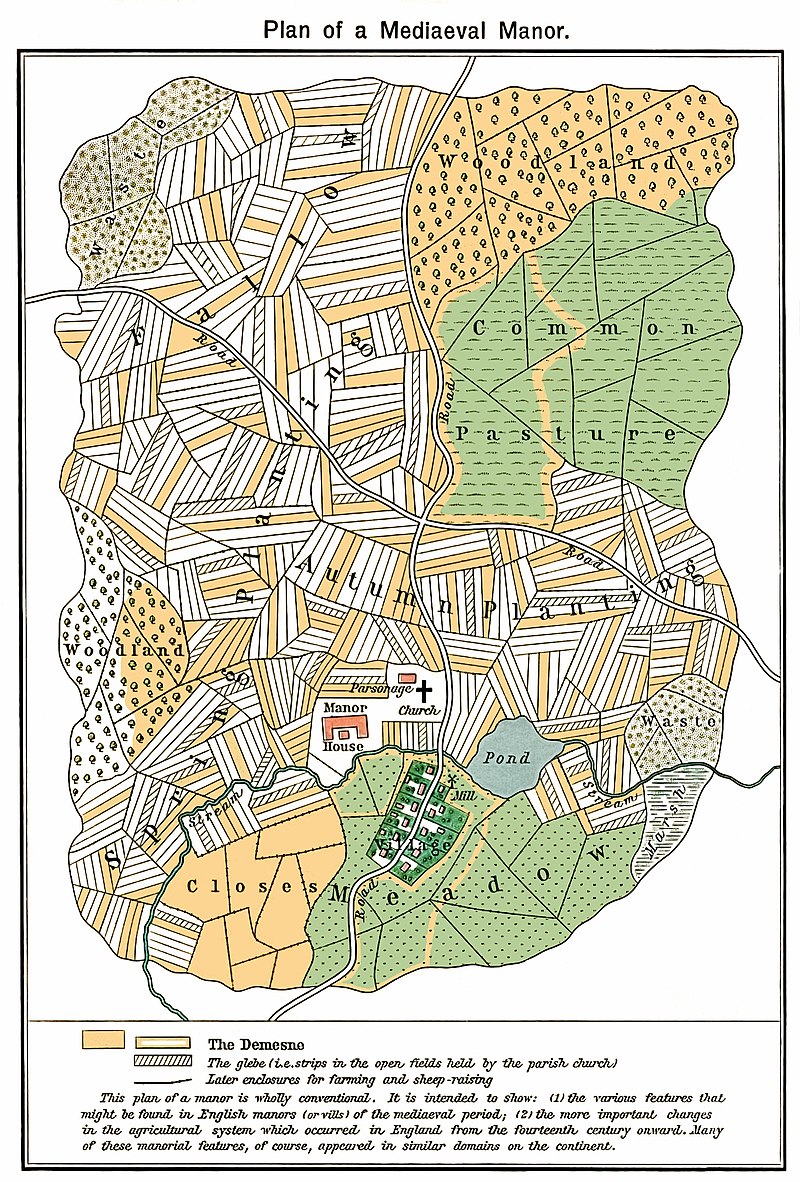 Map of a medieval manor. Notice the large commons area and the division of land into small strips. The mustard-colored areas are part of the demesne, the hatched areas part of the glebe. William R. Shepherd, Historical Atlas, 01923 According to some historians,[3] the modern capitalist system originated in the "crisis of the Late Middle Ages", a conflict between the land-owning aristocracy and the agricultural producers, or serfs. Manorial arrangements inhibited the development of capitalism in a number of ways. Serfs had obligations to produce for lords and to sustain their own families. The lords who owned the land[citation needed] relied on force to guarantee that they received sufficient food. Because lords expanded their power and wealth through military means, they spent their wealth on military equipment or on conspicuous consumption that helped foster alliances with other lords.[4] The demographic crisis of the 14th century upset this arrangement. This crisis had several causes: agricultural productivity reached its technological limitations and stopped growing, bad weather led to the Great Famine of 1315–1317, and the Black Death of 1348–1350 led to a population crash. These factors led to a decline in agricultural production. In response, feudal lords sought to expand agricultural production by extending their domains through warfare; therefore they demanded more tribute from their serfs to pay for military expenses. In England, many serfs rebelled. Some moved to towns, some bought land, and some entered into favorable contracts to rent lands from lords who needed to repopulate their estates.[5] In effect, feudalism began to lay some of the foundations necessary for the development of mercantilism, a precursor of capitalism. Feudalism lasted from the medieval period through the 16th century. Feudal manors were almost entirely self-sufficient, and therefore limited the role of the market. This stifled any incipient tendency towards capitalism. However, the relatively sudden emergence of new technologies and discoveries, particularly in agriculture[6] and exploration, facilitated the growth of capitalism. The most important development at the end of feudalism[citation needed] was the emergence of what Robert Degan calls "the dichotomy between wage earners and capitalist merchants".[7] The competitive nature meant there are always winners and losers, and this became clear as feudalism evolved into mercantilism, an economic system characterized by the private or corporate ownership of capital goods, investments determined by private decisions, and by prices, production, and the distribution of goods determined mainly by competition in a free market.[citation needed] |
農業資本主義 14世紀の危機  中世の荘園の地図。広大な共有地と、土地が細長い区画に分割されていることに注目して。マスタード色の部分は領主の所有地(デムズン)、斜線部分は小作人の耕作地(グリーブ)だ。 ウィリアム・R・シェパード『歴史地図帳』、1923年 一部の歴史家によると[3]、現代の資本主義システムは「中世後期の危機」と呼ばれる、土地所有貴族と農業生産者(農奴)との対立から生まれた。荘園制度 は資本主義の発展を複数の面で阻害した。農奴は領主への生産義務と自身の家族を養う義務を負っていた。土地を所有する領主[出典必要]は、十分な食料を確 保するために武力に依存していた。領主は軍事手段を通じて権力と富を拡大したため、その富を軍事装備や他の領主との同盟関係を強化する目立つ消費に費やし た。[4] 14 世紀の人口危機は、この体制を崩壊させた。この危機にはいくつかの原因があった。農業の生産性が技術的な限界に達して成長が止まったこと、悪天候によって 1315 年から 1317 年にかけて大飢饉が発生したこと、1348 年から 1350 年にかけてペストが流行して人口が激減したことなどだ。これらの要因により、農業生産は低迷した。これに対応して、封建領主は戦争を通じて領土を拡大し農 業生産を拡大しようとした。そのため、軍事費を賄うために農奴からより多くの貢物を要求した。イングランドでは多くの農奴が反乱を起こした。一部は町に移 住し、一部は土地を購入し、一部は領主から土地を借りる有利な契約を結んだ。[5] 事実上、封建制度は、資本主義の前身である重商主義の発展に必要な基礎の一部を築き始めた。封建制度は、中世から 16 世紀まで続いた。封建領地はほぼ完全に自給自足であり、そのため市場の役割は限定的だった。これにより、資本主義への初期的な傾向は抑制された。しかし、 特に農業[6] や探検分野における新しい技術や発見の比較的突然の出現が、資本主義の成長を促進した。封建制度末期の最も重要な発展[要出典] は、ロバート・デガンが「賃金労働者と資本主義商人との二分化」と呼ぶものの出現だった。[7] 競争の性質上、勝者と敗者が必ず出現することになり、これは、封建制度が、資本財の個人または企業による所有、個人の決定による投資、そして主に自由市場 での競争によって決定される価格、生産、および商品の流通を特徴とする経済システムである重商主義へと発展するにつれて明らかになった。 |
| Enclosure Main article: Enclosure  Decaying hedges mark the lines of the straight field boundaries created by an inclosure act. England in the 16th century was already a centralized state, in which much of the feudal order of Medieval Europe had been swept away. This centralization was strengthened by a good system of roads and a disproportionately large capital city, London.[8] The capital acted as a central market for the entire country, creating a large internal market for goods, in contrast to the fragmented feudal holdings that prevailed in most parts of the Continent. The economic foundations of the agricultural system were also beginning to diverge substantially; the manorial system had broken down by this time, and land began to be concentrated in the hands of fewer landlords with increasingly large estates. The system put pressure on both the landlords and the tenants to increase agricultural productivity to create profit. The weakened coercive power of the aristocracy to extract peasant surpluses encouraged them to try out better methods. The tenants also had an incentive to improve their methods to succeed in an increasingly competitive labour market. Land rents had moved away from the previous stagnant system of custom and feudal obligation, and were becoming directly subject to economic market forces. An important aspect of this process of change was the enclosure[9] of the common land previously held in the open field system where peasants had traditional rights, such as mowing meadows for hay and grazing livestock. Once enclosed, these uses of the land became restricted to the owner, and it ceased to be land for commons. The process of enclosure began to be a widespread feature of the English agricultural landscape during the 16th century. By the 19th century, unenclosed commons had become largely restricted to rough pasture in mountainous areas and to relatively small parts of the lowlands. Marxist and neo-Marxist historians argue that rich landowners used their control of state processes to appropriate public land for their private benefit. This created a landless working class that provided the labour required in the new industries developing in the north of England. For example: "In agriculture the years between 1760 and 1820 are the years of wholesale enclosure in which, in village after village, common rights are lost".[10] "Enclosure (when all the sophistications are allowed for) was a plain enough case of class robbery".[11] Anthropologist Jason Hickel notes that this process of enclosure led to myriad peasant revolts, among them Kett's Rebellion and the Midland Revolt, which culminated in violent repression and executions.[12] Other scholars[13] argue that the better-off members of the European peasantry encouraged and participated actively in enclosure, seeking to end the perpetual poverty of subsistence farming. "We should be careful not to ascribe to [enclosure] developments that were the consequence of a much broader and more complex process of historical change."[14] "[T]he impact of eighteenth and nineteenth century enclosure has been grossly exaggerated...."[15] |
囲い込み 主な記事:囲い込み  腐朽した生垣が、囲い込み法によって作られたまっすぐな畑の境界線を示している。 16世紀のイギリスは、中世ヨーロッパの封建制度が大部分が消滅した、すでに中央集権的な国家だった。この中央集権化は、優れた道路網と、不釣り合いに大 きな首都ロンドンによって強化された。[8] 首都は全国の中央市場として機能し、大陸の大部分で支配的だった分断された封建領地とは対照的に、大規模な国内市場を形成した。農業システムの経済的基盤 も著しく分岐し始めていた。この頃には荘園制度が崩壊し、土地はますます大規模な領地を所有する少数の地主の手に集中し始めた。このシステムは、地主と小 作人双方に農業生産性を向上させて利益を創出する圧力をかけた。貴族の強制力が弱まり、農民の余剰生産物を徴収する能力が低下したため、彼らはより良い方 法を試すようになった。小作人も、ますます競争が激化する労働市場で成功するため、方法の改善に意欲を示した。地代は、以前の慣習と封建的義務に基づく停 滞したシステムから離れ、経済的市場原理に直接左右されるようになっていった。 この変化のプロセスにおける重要な側面の一つは、農民が伝統的な権利(例えば、牧草地を刈り取って干し草を採取したり、家畜を放牧したりする権利)を持っ ていたオープンフィールドシステムで管理されていた共有地の囲い込み[9]だった。囲い込みが完了すると、これらの土地の利用は所有者に限定され、共有地 としての性格を失った。囲い込みのプロセスは、16世紀にイングランドの農業景観の広範な特徴となるようになった。19世紀までに、囲い込みが行われてい ない共有地は、山岳地帯の荒れた牧草地や低地の比較的狭い地域にほとんど限定されるようになった。 マルクス主義や新マルクス主義の歴史家は、富裕な土地所有者が国家の過程を支配して、公共の土地を私的な利益のために収奪したと主張している。これによ り、イングランド北部で発展した新しい産業に必要な労働力を提供する、土地を持たない労働者階級が生まれた。例えば:「農業において、1760年から 1820年までの期間は、村から村へと共同利用権が失われていく大規模な囲い込みの時代だった」。[10] 「囲い込み(あらゆる複雑な要素を考慮しても)は、明白な階級略奪のケースだった」。[11] 人類学者のジェイソン・ヒッケルは、この囲い込みのプロセスが、ケッツの反乱やミッドランド反乱を含む数多くの農民反乱を引き起こし、暴力的な弾圧と処刑 で終結したと指摘している。[12] 他の学者たち[13] は、ヨーロッパの農民のうち比較的裕福な層が、自給自足の農業による永久的な貧困を終わらせるため、囲い込みを奨励し、積極的に参加したと主張している。 「囲い込みに、より広範で複雑な歴史的変化の結果として生じた発展を帰属させてはならない」[14]。「18世紀と19世紀の囲い込みの影響は過大評価さ れている」[15]。 |
| Merchant capitalism and mercantilism Main articles: Merchant capitalism and Mercantilism Precedents  The city of Genoa, one of the birthplaces of capitalism While trade has existed since early in human history, it was not capitalism.[16] The earliest recorded activity of long-distance profit-seeking merchants can be traced to the old Assyrian merchants active in Mesopotamia the 2nd millennium BCE.[17] The Roman Empire developed more advanced forms of commerce, and similarly widespread networks existed in Islamic nations. However, capitalism took shape in Europe in the late Middle Ages and Renaissance. An early emergence of commerce occurred on monastic estates in Italy and France, but in particular in the independent Italian city-states during the late Middle Ages, such as Florence, Genoa and Venice. Those states pioneered innovative financial instruments such as bills of exchange and banking practices that facilitated long-distance trade. The competitive nature of these city-states fostered a spirit of innovation and risk-taking, laying the groundwork for capitalism's core principles of private ownership, market competition, and profit-seeking behavior. The economic prowess of the Italian city-states during this time not only fueled its own prosperity but also contributed significantly to the spread of capitalist ideas and practices throughout Europe and beyond.[18][19] |
商人資本主義と重商主義 主な記事:商人資本主義と重商主義 先例  資本主義の発祥地のひとつであるジェノヴァ市 貿易は人類の歴史の初期から存在していたが、それは資本主義ではなかった。[16] 最古の記録に残る長距離貿易を行う利益追求型の商人の活動は、紀元前2千年紀のメソポタミアで活動していた古代アッシリアの商人まで遡ることができる。 [17] ローマ帝国はより高度な商業形態を発展させ、イスラム国民にも同様の広範なネットワークが存在した。しかし、資本主義は中世後期とルネサンス期にヨーロッ パで形を成した。 商業の早期の出現は、イタリアとフランスの修道院領で起こったが、特に中世後期の独立したイタリアの都市国家、フィレンツェ、ジェノヴァ、ヴェネツィアな どで顕著だった。これらの都市国家は、為替手形や銀行業務などの革新的な金融手段を考案し、長距離貿易を促進した。これらの都市国家の競争的な性質は、革 新とリスクテイクの精神を育み、資本主義の核心的な原則である私有財産、市場競争、利益追求行動の基盤を築いた。この時代のイタリアの都市国家の経済的優 位性は、自らの繁栄を促進するだけでなく、資本主義の思想と実践がヨーロッパ全土およびその先へ広がることに大きく貢献した。[18][19] |
| Emergence Modern capitalism resembles some elements of mercantilism in the early modern period between the 16th and 18th centuries.[20][21] Early evidence for mercantilist practices appears in early modern Venice, Genoa, and Pisa over the Mediterranean trade in bullion. The region of mercantilism's real birth, however, was the Atlantic Ocean.[22]  Sir Josiah Child, an influential proponent of mercantilism. Painting attributed to John Riley. England began a large-scale and integrative approach to mercantilism during the Elizabethan Era. An early statement on national balance of trade appeared in Discourse of the Common Weal of this Realm of England, 1549: "We must always take heed that we buy no more from strangers than we sell them, for so should we impoverish ourselves and enrich them."[23][full citation needed] The period featured various but often disjointed efforts by the court of Queen Elizabeth to develop a naval and merchant fleet capable of challenging the Spanish stranglehold on trade and of expanding the growth of bullion at home. Elizabeth promoted the Trade and Navigation Acts in Parliament and issued orders to her navy for the protection and promotion of English shipping. These efforts organized national resources sufficiently in the defense of England against the far larger and more powerful Spanish Empire, and in turn paved the foundation for establishing a global empire in the 19th century.[citation needed] The authors noted most for establishing the English mercantilist system include Gerard de Malynes and Thomas Mun, who first articulated the Elizabethan System. The latter's England's Treasure by Forraign Trade, or the Balance of our Forraign Trade is The Rule of Our Treasure gave a systematic and coherent explanation of the concept of balance of trade. It was written in the 1620s and published in 1664.[24] Mercantile doctrines were further developed by Josiah Child. Numerous French authors helped to cement French policy around mercantilism in the 17th century. French mercantilism was best articulated by Jean-Baptiste Colbert (in office, 1665–1683), although his policies were greatly liberalised under Napoleon. |
出現 現代資本主義は、16 世紀から 18 世紀にかけての近世初期の重商主義の一部の要素と類似している。[20][21] 重商主義の慣行の初期の証拠は、地中海における貴金属の取引において、近世初期のヴェネツィア、ジェノヴァ、ピサで見られる。しかし、重商主義が実際に誕 生したのは大西洋地域だった。[22]  重商主義の有力な支持者であったジョサイア・チャイルド卿。ジョン・ライリーによる絵画。 イングランドは、エリザベス朝時代に、大規模かつ統合的な重商主義政策を開始した。貿易収支に関する初期の声明は、1549年の『イングランド王国の公共 の福祉に関する言説』に掲載されている。「私たちは、他国から購入する量よりも販売する量が多くなることがないように常に注意しなければならない。そうし なければ、私たちは自らを貧しくし、他国を豊かにすることになるからだ。」[23][出典必要] この時代、エリザベス女王の宮廷は、スペインの貿易支配に挑戦し、国内の貴金属の成長を拡大するための海軍と商船隊の整備に、多様なものの断片的な努力を 重ねた。エリザベスは議会で貿易と航海に関する法律を推進し、海軍に対して英国の船舶の保護と促進を命じた。 これらの努力は、はるかに大規模で強力なスペイン帝国に対するイングランドの防衛のために国民資源を十分に組織化し、その結果、19世紀に世界帝国を確立 するための基盤を築いた。[出典必要] イングランドの重商主義システムを確立した主要な人物として、ジェラード・デ・マリンズとトーマス・ムンが挙げられる。後者の『イングランドの財宝は外国 貿易により、または外国貿易の均衡により、すなわち財宝の規則により』は、貿易収支の概念を体系的かつ一貫した形で説明した。この著作は1620年代に執 筆され、1664年に出版された。[24] 商業主義の教義はジョサイア・チャイルドによってさらに発展した。17世紀には、多くのフランス人著者がフランス政策を商業主義に固めるのに貢献した。フ ランス商業主義はジャン=バティスト・コルベール(在任1665–1683)によって最も明確に表現されたが、彼の政策はナポレオンの下で大幅に自由化さ れた。 |
| Doctrines Under mercantilism, European merchants, backed by state controls, subsidies, and monopolies, made most of their profits from buying and selling goods. In the words of Francis Bacon, the purpose of mercantilism was "the opening and well-balancing of trade; the cherishing of manufacturers; the banishing of idleness; the repressing of waste and excess by sumptuary laws; the improvement and husbanding of the soil; the regulation of prices..."[25] Similar practices of economic regimentation had begun earlier in medieval towns. However, under mercantilism, given the contemporaneous rise of absolutism, the state superseded the local guilds as the regulator of the economy. 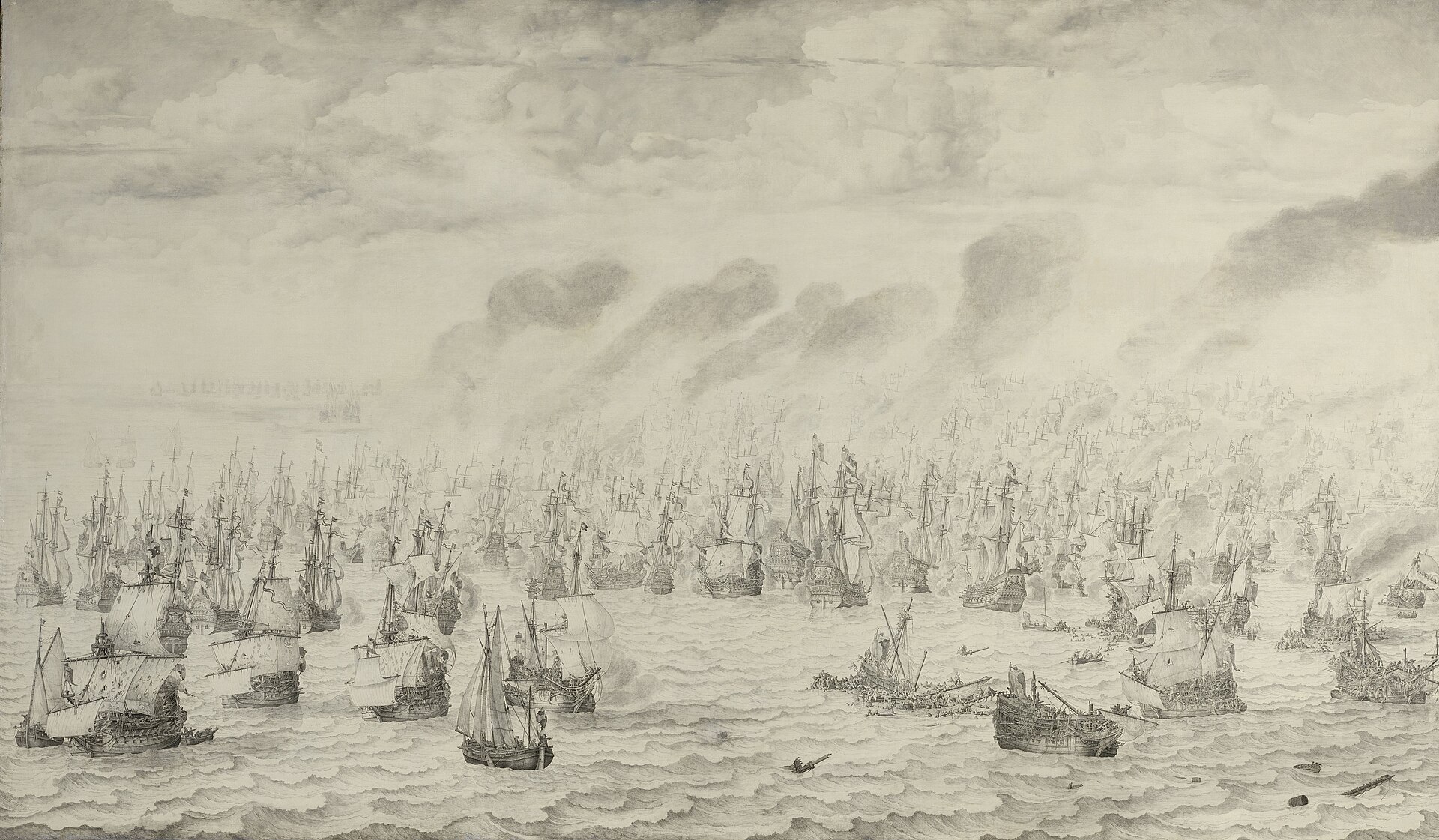 The Anglo-Dutch Wars were fought between the English and the Dutch for control over the seas and trade routes. Among the major tenets of mercantilist theory was bullionism, a doctrine stressing the importance of accumulating precious metals. Mercantilists argued that a state should export more goods than it imported so that foreigners would have to pay the difference in precious metals. Mercantilists asserted that only raw materials that could not be extracted at home should be imported. They promoted the idea that government subsidies, such as granting monopolies and protective tariffs, were necessary to encourage home production of manufactured goods. Proponents of mercantilism emphasized state power and overseas conquest as the principal aim of economic policy. If a state could not supply its own raw materials, according to the mercantilists, it should acquire colonies from which they could be extracted. Colonies constituted not only sources of raw materials but also markets for finished products. Because it was not in the interests of the state to allow competition, to help the mercantilists, colonies should be prevented from engaging in manufacturing and trading with foreign powers. Mercantilism was a system of trade for profit, although commodities were still largely produced by non-capitalist production methods.[26] Noting the various pre-capitalist features of mercantilism, Karl Polanyi argued that "mercantilism, with all its tendency toward commercialization, never attacked the safeguards which protected [the] two basic elements of production – labor and land – from becoming the elements of commerce." Thus mercantilist regulation was more akin to feudalism than capitalism. According to Polanyi, "not until 1834 was a competitive labor market established in England, hence industrial capitalism as a social system cannot be said to have existed before that date."[27] |
教義 重商主義の下では、国家の規制、補助金、独占の支援を受けたヨーロッパの商人は、商品の売買によってほとんどの利益を得ていた。フランシス・ベーコンの言 葉を借りれば、重商主義の目的は「貿易の開放と均衡の維持、製造業の育成、怠惰の排除、奢侈禁止法による浪費と過剰の抑制、土地の改良と管理、価格の規 制……」だった[25]。同様の経済統制の慣行は、中世の都市でより早くから始まっていた。しかし、重商主義の下では、同時期に絶対主義が台頭したため、 経済を規制する役割は、地元のギルドから国家に移った。  英蘭戦争は、海と貿易ルートの支配権を争う、イギリスとオランダの間で戦われた戦争だ。 重商主義の主要な教義の一つは、貴金属の蓄積の重要性を強調する貴金属主義だった。重商主義者は、国家は輸入よりも多くの商品を輸出し、その差額を外国に 貴金属で支払わせるべきだと主張した。重商主義者は、国内で採掘できない原材料のみ輸入すべきだと主張した。彼らは、製造品の国内生産を促進するために、 独占権の付与や保護関税などの政府補助金が不可欠であると主張した。 重商主義の支持者は、経済政策の主な目的として国家の権力と海外征服を強調した。重商主義者によると、国家が自国の原材料を供給できない場合、それらを採 掘できる植民地を獲得すべきだとしました。植民地は原材料の供給源だけでなく、完成品の市場としても機能しました。国家の利益に反するため、重商主義者を 支援するために、植民地は製造業や外国との貿易を禁止されるべきだとされました。 重商主義は利益を目的とした貿易システムだったが、商品の大部分は依然として非資本主義的な生産方法によって生産されていた。[26] 重商主義の様々な前資本主義的特徴を指摘し、カール・ポラニーは「重商主義は、商業化への傾向にもかかわらず、生産の二つの基本要素である労働と土地が商 業の要素となることを防ぐ安全装置を攻撃しなかった」と主張した。したがって、重商主義の規制は資本主義よりも封建制に近かった。ポラニーによると、 「1834年までイギリスに競争的な労働市場が確立されなかったため、産業資本主義として社会システムが存在したとは、その日付以前には言えない」 [27]。 |
Chartered trading companies British East India Company 1801 The Muscovy Company was the first major chartered joint stock English trading company. It was established in 1555 with a monopoly on trade between England and Muscovy. It was an offshoot of the earlier Company of Merchant Adventurers to New Lands, founded in 1551 by Richard Chancellor, Sebastian Cabot and Sir Hugh Willoughby to locate the Northeast Passage to China to allow trade. This was the precursor to a type of business that would soon flourish in England, the Dutch Republic and elsewhere. The British East India Company (1600) and the Dutch East India Company (1602) launched an era of large state chartered trading companies.[28][29] These companies were characterized by their monopoly on trade, granted by letters patent provided by the state. Recognized as chartered joint-stock companies by the state, these companies enjoyed lawmaking, military, and treaty-making privileges.[30] Characterized by its colonial and expansionary powers by states, powerful nation-states sought to accumulate precious metals, and military conflicts arose.[28] During this era, merchants, who had previously traded on their own, invested capital in the East India Companies and other colonies, seeking a return on investment. |
特許貿易会社 イギリス東インド会社 1801 ムスコヴィ会社は、最初の主要な特許合資会社であるイギリスの貿易会社だった。1555年に設立され、イギリスとムスコヴィ間の貿易の独占権を持ってい た。これは、1551年にリチャード・チャネル、セバスチャン・カボット、サー・ヒュー・ウィロビーによって設立された「新大陸への商人冒険者会社」の分 派で、中国への東北航路の発見を目的として設立された。これは、イギリス、オランダ共和国、その他の地域で繁栄する新たなビジネス形態の先駆けとなった。 イギリス東インド会社(1600年)とオランダ東インド会社(1602年)は、国家が特許状を付与した大規模な貿易会社の時代を築いた。[28][29] これらの会社は、国家から付与された特許状により貿易の独占権を保持していたことが特徴だった。国家から特許状を付与された合資会社として認められたこれ らの会社は、立法権、軍事権、条約締結権などの特権を享受した。[30] 国家の植民地化と拡張政策により、強力な国民は貴金属の蓄積を追求し、軍事衝突が発生した。[28] この時代、従来は個人で貿易を行っていた商人たちは、東インド会社や他の植民地に資本を投資し、投資利益を追求した。 |
Industrial capitalism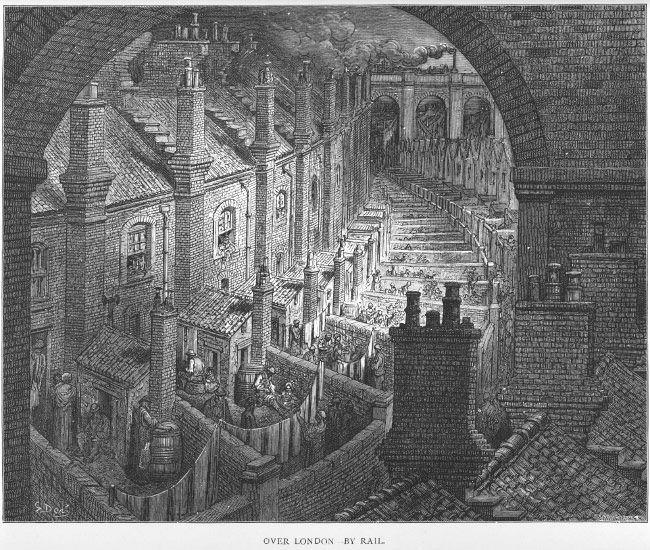 Gustave Doré's 19th-century engraving depicted the dirty, overcrowded slums where the industrial workers of London lived. Mercantilism declined in Great Britain in the mid-18th century, when a new group of economic theorists, led by Adam Smith, challenged fundamental mercantilist doctrines, such as that the world's wealth remained constant and that a state could increase its wealth only at the expense of another state. However, mercantilism continued in less developed economies, such as Prussia and Russia, with their much younger manufacturing bases. The mid-18th century gave rise to industrial capitalism, made possible by (1) the accumulation of vast amounts of capital under the merchant phase of capitalism and its investment in machinery, and (2) the fact that the enclosures meant that Britain had a large population of people with no access to subsistence agriculture, who needed to buy basic commodities via the market, ensuring a mass consumer market.[31] Industrial capitalism, which Marx dated from the last third of the 18th century, marked the development of the factory system of manufacturing, characterized by a complex division of labor between and within work processes and the routinization of work tasks. Industrial capitalism finally established the global domination of the capitalist mode of production.[20] During the resulting Industrial Revolution, the industrialist replaced the merchant as a dominant actor in the capitalist system, which led to the decline of the traditional handicraft skills of artisans, guilds, and journeymen. Also during this period, capitalism transformed relations between the British landowning gentry and peasants, giving rise to the production of cash crops for the market rather than for subsistence on a feudal manor. The surplus generated by the rise of commercial agriculture encouraged increased mechanization of agriculture. There is an active debate on the role of the Atlantic slavery in the emergence of industrial capitalism.[32] Eric Williams (1944) argued on Capitalism and Slavery about the crucial role of plantation slavery in the growth of industrial capitalism, since both happened in similar time periods. Harvey (2019) wrote that "A flagship of the industrial revolution, the Lancashire mills and their 465,000 textile workers, was entirely reliant [in the 1860s] on the labour of three million cotton slaves in the American Deep South."[33] |
産業資本主義 ギュスターヴ・ドレの19世紀の版画は、ロンドンの産業労働者が住んでいた汚く過密なスラム街を描いたものだよ(そうか?!ありがとう)。 18世紀半ば、アダム・スミスをリーダーとする新しい経済理論家たちが、世界の富は一定であり、国家は他の国家の犠牲によってのみ富を増やすことができる という、重商主義の基本教義に異議を唱えたことで、イギリスでは重商主義が衰退した。しかし、プロイセンやロシアなど、製造業の基盤がまだ未熟な後進国で は、重商主義が継続した。 18世紀半ばには、産業資本主義が台頭した。これは、(1) 資本主義の商人段階における莫大な資本の蓄積とその機械への投資、および (2) 囲い込みによりイギリスに自給自足農業にアクセスできない大規模な人々(すなわち、イギリスにおける消費者の大部分を占める人々)が生まれ、彼らが市場を 通じて基本商品を購入する必要が生じたため、大規模な消費者市場が確保されたこと、の2つの要因により可能となった。[31] マルクスが18世紀後半に起源を置く産業資本主義は、製造における工場制度の発展を特徴とし、作業プロセス間およびプロセス内の複雑な分業と作業のルー ティン化が特徴だった。産業資本主義は最終的に資本主義的生産方式のグローバルな支配を確立した。[20] その結果生じた産業革命において、資本主義システムにおける支配的な役割は商人から実業家に移り、職人の伝統的な手工業の技能、ギルド、見習い制度は衰退 した。また、この期間、資本主義はイギリスの土地所有貴族と農民の関係を変革し、封建的な荘園での自給自足ではなく、市場向けの換金作物の生産が盛んに なった。商業農業の台頭によって生じた余剰は、農業の機械化の進展を促した。 大西洋奴隷貿易が産業資本主義の台頭において果たした役割については、活発な議論がある[32]。エリック・ウィリアムズ(1944)は、『資本主義と奴 隷制』の中で、産業資本主義の成長と奴隷制は同時期に起こったことから、プランテーション奴隷制が産業資本主義の成長に重要な役割を果たしたと主張した。 ハーヴェイ(2019)は、「産業革命の象徴であるランカシャーの工場と46万5,000人の紡績労働者は、1860年代にはアメリカ南部の300万人の 綿花奴隷の労働力に完全に依存していた」と書いている。[33] |
| Industrial Revolution Main article: Industrial Revolution The productivity gains of capitalist production began a sustained and unprecedented increase at the turn of the 19th century, in a process commonly referred to as the Industrial Revolution. Starting in about 1760 in England, there was a steady transition to new manufacturing processes in a variety of industries, including going from hand production methods to machine production, new chemical manufacturing and iron production processes, improved efficiency of water power, the increasing use of steam power and the development of machine tools. It also included the change from wood and other bio-fuels to coal.  The Spinning mule, built by the inventor Samuel Crompton In textile manufacturing, mechanized cotton spinning powered by steam or water increased the output of a worker by a factor of about 1000, due to the application of James Hargreaves' spinning jenny, Richard Arkwright's water frame, Samuel Crompton's Spinning Mule and other inventions. The power loom increased the output of a worker by a factor of over 40.[34] The cotton gin increased the productivity of removing seed from cotton by a factor of 50. Large gains in productivity also occurred in spinning and weaving wool and linen, although they were not as great as in cotton. Finance 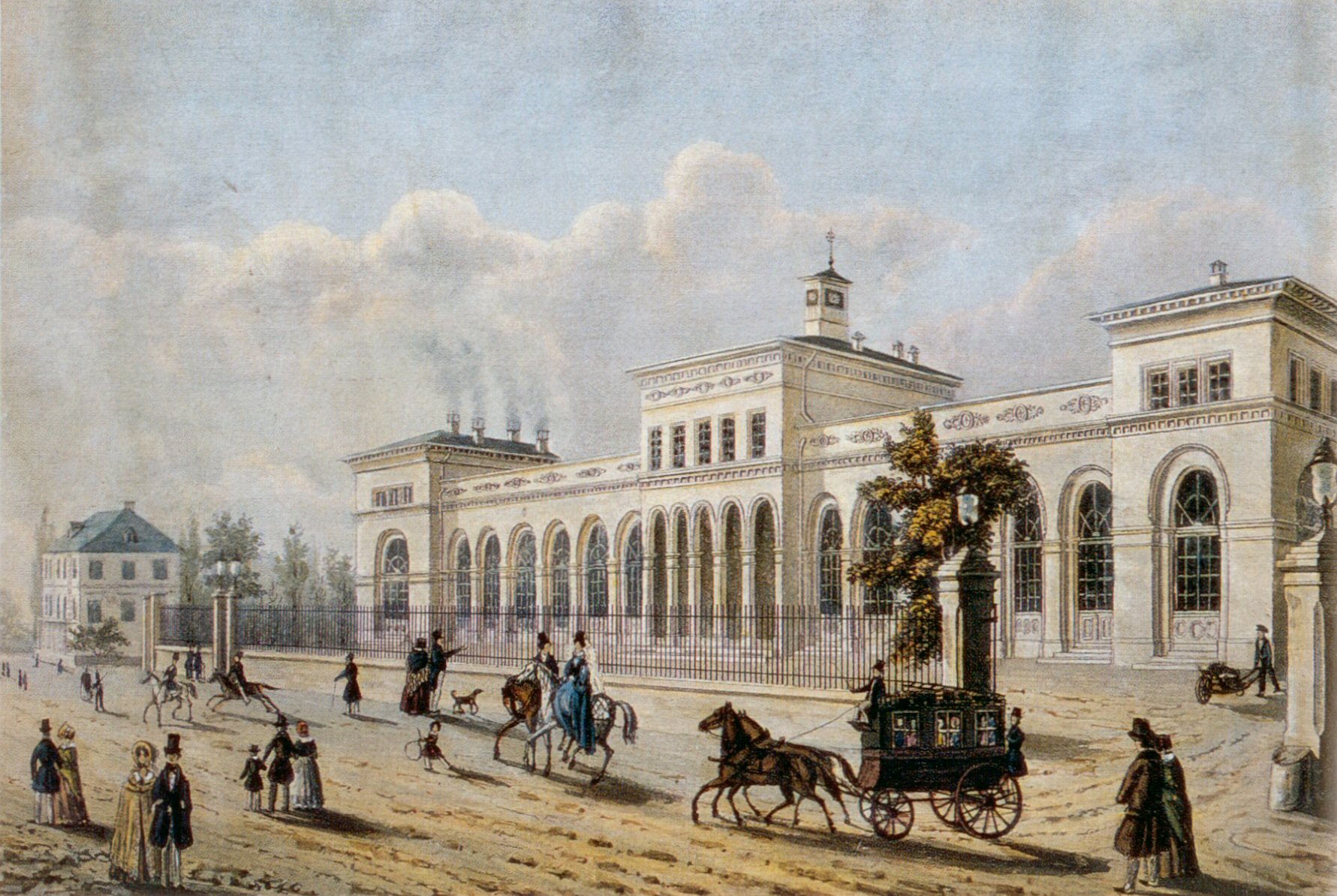 The Rothschild family revolutionised international finance. The Frankfurt terminus of the Taunus Railway was financed by the Rothschilds and opened in 1840 as one of Germany's first railways. The growth of Britain's industry stimulated a concomitant growth in its system of finance and credit. In the 18th century, services offered by banks increased. Clearing facilities, security investments, cheques and overdraft protections were introduced. Cheques had been invented in the 17th century in England, and banks settled payments by direct courier to the issuing bank. Around 1770, they began meeting in a central location, and by the 19th century a dedicated space was established, known as a bankers' clearing house. The London clearing house used a method where each bank paid cash to and then was paid cash by an inspector at the end of each day. The first overdraft facility was set up in 1728 by The Royal Bank of Scotland. The end of the Napoleonic War and the subsequent rebound in trade led to an expansion in the bullion reserves held by the Bank of England, from a low of under 4 million pounds in 1821 to 14 million pounds by late 1824. Older innovations became routine parts of financial life during the 19th century. The Bank of England first issued bank notes during the 17th century, but the notes were hand written and few in number. After 1725, they were partially printed, but cashiers still had to sign each note and make them payable to a named person. In 1844, parliament passed the Bank Charter Act tying these notes to gold reserves, effectively creating the institution of central banking and monetary policy. The notes became fully printed and widely available from 1855.[citation needed] Growing international trade increased the number of banks, especially in London. These new "merchant banks" facilitated trade growth, profiting from England's emerging dominance in seaborne shipping. Two immigrant families, Rothschild and Baring, established merchant banking firms in London in the late 18th century and came to dominate world banking in the next century. The tremendous wealth amassed by these banking firms soon attracted much attention. The poet George Gordon Byron wrote in 1823: "Who makes politics run glibber all?/ The shade of Bonaparte's noble daring?/ Jew Rothschild and his fellow-Christian, Baring." The operation of banks also shifted. At the beginning of the century, banking was still an elite preoccupation of a handful of very wealthy families. Within a few decades, however, a new sort of banking had emerged, owned by anonymous stockholders, run by professional managers, and the recipient of the deposits of a growing body of small middle-class savers. Although this breed of banks was newly prominent, it was not new – the Quaker family Barclays had been banking in this way since 1690. |
産業革命 主な記事:産業革命 資本主義生産の生産性の向上は、19 世紀の変わり目に、産業革命と一般に呼ばれる過程で、持続的かつ前例のない増加を始めました。1760年頃、イギリスで始まったこの変化は、手作業による 生産から機械生産への移行、新しい化学製造や鉄の製造プロセス、水力の効率向上、蒸気力の利用拡大、工作機械の開発など、さまざまな産業で新しい製造プロ セスへの着実な移行をもたらした。また、木材やその他のバイオ燃料から石炭への燃料の転換も含まれた。  発明家サミュエル・クロンプトンによって製作された紡績機「スピニング・ミュール」 紡績産業では、蒸気や水力で駆動される機械化された綿紡績が、ジェームズ・ハーグリーブズの「スピンニング・ジェニー」、リチャード・アークロフトの 「ウォーター・フレーム」、サミュエル・クロンプトンの「スピンニング・ミュール」などの発明により、労働者の生産性を約1000倍に増加させた。パ ワー・ロームは、労働者の生産性を40倍以上増加させた。[34] 綿繰り機は、綿から種を取り除く生産性を50倍に増加させた。羊毛や麻の紡績と織物においても生産性の大幅な向上が見られたが、綿ほどではなかった。 金融  ロスチャイルド家は国際金融に革命をもたらした。タウヌス鉄道のフランクフルト終着駅はロスチャイルド家によって資金提供され、1840年にドイツ初の鉄道の一つとして開業した。 イギリスの産業の成長は、その金融と信用システムの発展を同時に促進した。18世紀には、銀行が提供するサービスが増加した。決済施設、証券投資、小切 手、当座貸越保護が導入された。小切手は17世紀にイギリスで発明され、銀行は発行銀行への直接の宅配便で支払いを清算していた。1770年ごろ、銀行は 中央の場所で集まり始め、19世紀には専用のスペースが設けられ、銀行清算所と呼ばれるようになった。ロンドン清算所では、各銀行が1日の終わりに検査官 に現金で支払い、その後検査官から現金で支払われる方法が採用されていた。最初の当座貸越制度は1728年にロイヤル・バンク・オブ・スコットランドに よって設立された。 ナポレオン戦争の終結とそれに続く貿易の回復により、イングランド銀行が保有する金塊準備高は、1821年の400万ポンド未満から、1824年末には1,400万ポンドまで増加した。 19世紀には、古い革新技術が金融生活の日常的な一部となった。イングランド銀行は17世紀に初めて銀行券を発行したが、手書きで枚数も少なかった。 1725年以降、一部が印刷されるようになったが、出納係は各券に署名し、特定の人格宛てに支払いを指定する必要があった。1844年、議会は銀行憲章法 (Bank Charter Act)を可決し、これらの銀行券を金準備に連動させることで、中央銀行制度と貨幣政策の機関を実質的に創設した。紙幣は1855年から完全に印刷され、 広く流通するようになった。 国際貿易の拡大に伴い、特にロンドンで銀行の数が増加した。これらの新しい「商社銀行」は、英国の海上輸送における優位性の拡大から利益を得て、貿易の成 長を促進した。18世紀後半、ロスチャイルド家とベアリング家の2つの移民家族がロンドンに商社銀行を設立し、翌世紀には世界銀行業界を支配するに至っ た。これらの銀行が蓄積した莫大な富は、すぐに大きな注目を集めた。詩人のジョージ・ゴードン・バイロンは1823年に次のように書いている。「政治を円 滑に動かすのは誰だ?/ ナポレオンの勇敢な影か?/ ユダヤ人のロスチャイルドと彼のキリスト教徒の仲間、ベアリングか?」 銀行の業務も変化した。世紀の初め、銀行業務はごく少数の富裕層の家族によるエリートの専売特許だった。しかし、数十年後には、匿名の株主が所有し、専門 の経営者が運営し、増加する中産階級の小規模貯蓄者からの預金を受け入れる、新しいタイプの銀行が登場した。この種の銀行は新たに台頭したものだったが、 決して新しいものではなかった。クエーカー教徒のバークレー家は、1690年からこの方式で銀行業を営んでいた。 |
| Free trade and globalization At the height of the First French Empire, Napoleon sought to introduce a "continental system" that would render Europe economically autonomous, thereby emasculating British trade and commerce. It involved such stratagems as the use of beet sugar in preference to the cane sugar that had to be imported from the tropics. Although this caused businessmen in England to agitate for peace, Britain persevered, in part because it was well into the Industrial Revolution. The war had the opposite effect – it stimulated the growth of certain industries, such as pig-iron production which increased from 68,000 tons in 1788 to 244,000 by 1806.[citation needed]  19th-century Great Britain become the first global economic superpower, because of superior manufacturing technology and improved global communications such as steamships and railroads. In 1817, David Ricardo, James Mill and Robert Torrens, in the famous theory of comparative advantage, argued that free trade would benefit the industrially weak as well as the strong. In Principles of Political Economy and Taxation, Ricardo advanced the doctrine still considered the most counterintuitive in economics: When an inefficient producer sends the merchandise it produces best to a country able to produce it more efficiently, both countries benefit. By the mid 19th century, Britain was firmly wedded to the notion of free trade, and the first era of globalization began.[20] In the 1840s, the Corn Laws and the Navigation Acts were repealed, ushering in a new age of free trade. In line with the teachings of the classical political economists, led by Adam Smith and David Ricardo, Britain embraced liberalism, encouraging competition and the development of a market economy. Industrialization allowed cheap production of household items using economies of scale,[citation needed] while rapid population growth created sustained demand for commodities. Nineteenth-century imperialism decisively shaped globalization in this period. After the First and Second Opium Wars by Britain and France and the completion of the British conquest of India by 1858, the French conquest of Africa, Polynesia and Indochina by 1887, vast populations of these regions became ready consumers of European exports. During this period, areas of sub-Saharan Africa and the Pacific islands were incorporated into the world system, especially by the British and French. Meanwhile, the European conquest of new parts of the globe, notably Africa by Britain and France, yielded valuable natural resources such as rubber, diamonds and coal and helped fuel trade and investment between the European imperial powers, their colonies, and the United States.[35] |
自由貿易とグローバル化 第一フランス帝国の最盛期、ナポレオンは、ヨーロッパを経済的に自立させ、それによってイギリスの貿易と商業を弱体化させる「大陸封鎖令」の導入を目指し た。この政策には、熱帯地方から輸入しなければならなかったサトウキビの砂糖に代わって、テンサイの砂糖を使用するという策略も含まれていた。この政策に より、イギリスの実業家たちは平和を訴えたが、イギリスは産業革命がすでにかなり進んでいたこともあり、この政策を堅持した。戦争は逆効果となり、 1788年に68,000トンだった銑鉄の生産量は1806年には244,000トンへと増加するなど、特定の産業の成長を促進した。  19世紀、英国は、優れた製造技術と蒸気船や鉄道などの世界的な通信手段の改善により、世界初の経済大国となった。 1817年、デヴィッド・リカード、ジェームズ・ミル、ロバート・トレンズは、有名な比較優位理論において、自由貿易は産業の弱い国にも強い国にも利益を もたらす、と主張した。『政治経済と課税の原理』の中で、リカードは、今でも経済学において最も直感に反する教義とみなされている、次のような教義を提唱 した。 非効率な生産者が、自分が最も生産効率の高い商品を、より効率的に生産できる国に輸出すると、両国ともに利益を得る。 19 世紀半ばまでに、英国は自由貿易の概念を固く信奉し、グローバル化の最初の時代が始まった[20]。1840 年代、穀物法と航海法が廃止され、自由貿易の新時代が幕を開けた。アダム・スミスやデビッド・リカードに代表される古典派経済学者たちの教えに沿って、英 国は自由主義を採用し、競争と市場経済の発展を奨励した。 工業化により、規模の経済を活かした家庭用品の低コスト生産が可能になり[出典必要]、急速な人口増加が商品への持続的な需要を生み出した。19世紀の帝 国主義は、この時代のグローバル化を決定的に形作った。イギリスとフランスの第一次・第二次アヘン戦争と、1858年までのイギリスのインド征服、 1887年までのフランスのアフリカ、ポリネシア、インドシナ征服により、これらの地域の広大な人口がヨーロッパの輸出品の主要な消費者となった。この期 間中、サハラ以南のアフリカと太平洋の島々は、特にイギリスとフランスによって世界システムに組み込まれました。一方、ヨーロッパの新たな地域(特にイギ リスとフランスによるアフリカ)の征服は、ゴム、ダイヤモンド、石炭などの貴重な天然資源をもたらし、ヨーロッパの帝国主義諸国、その植民地、およびアメ リカ合衆国間の貿易と投資を促進しました。[35] |
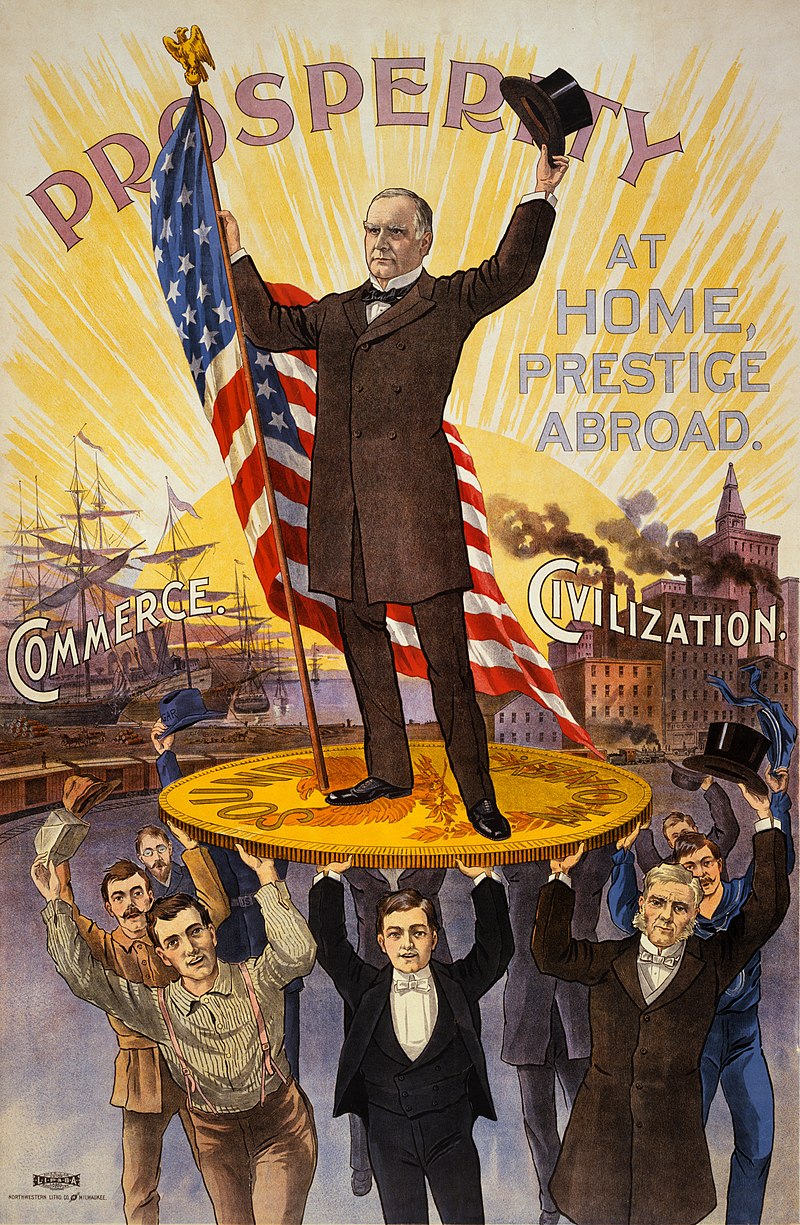 The gold standard formed the financial basis of the international economy from 1870 to 1914. The inhabitant of London could order by telephone, sipping his morning tea, the various products of the whole earth, and reasonably expect their early delivery upon his doorstep. Militarism and imperialism of racial and cultural rivalries were little more than the amusements of his daily newspaper. What an extraordinary episode in the economic progress of man was that age which came to an end in August 1914. The global financial system was mainly tied to the gold standard during this period. The United Kingdom first formally adopted this standard in 1821. Soon to follow was Canada in 1853, Newfoundland in 1865, and the United States and Germany (de jure) in 1873. New technologies, such as the telegraph, the transatlantic cable, the Radiotelephone, the steamship, and the railway allowed goods and information to move around the world at an unprecedented degree.[36] The eruption of civil war in the United States in 1861 and the blockade of its ports to international commerce meant that the main supply of cotton for the Lancashire looms was cut off. The textile industries shifted to reliance upon cotton from Africa and Asia during the course of the U.S. civil war, and this created pressure for an Anglo-French controlled canal through the Suez peninsula. The Suez canal opened in 1869, the same year in which the Central Pacific Railroad that spanned the North American continent was completed. Capitalism and the engine of profit were making the globe a smaller place. |
 金本位制は、1870年から1914年まで国際経済の金融基盤を形成していた。 ロンドンの住民は、朝の紅茶を飲みながら、電話で世界中のさまざまな商品を注文し、その商品が自分の玄関先に早く届くことを当然のように期待することがで きた。人種や文化の対立による軍国主義や帝国主義は、彼の毎日の新聞の娯楽にすぎなかった。1914年8月に終焉を迎えたその時代は、人類の経済発展にお いて、まさに驚異的な時代だった。 この期間、世界の金融システムは主に金本位制に縛られていた。イギリスが1821年にこの制度を正式に採用し、その後、1853年にカナダ、1865年に ニューファンドランド、1873年にアメリカとドイツ(法的に)がそれに続いた。電信、大西洋横断ケーブル、無線電話、蒸気船、鉄道などの新技術により、 商品や情報が前例のないほど世界中に流通するようになった。[36] 1861年にアメリカ合衆国で内戦が勃発し、その港が国際貿易に封鎖されたことで、ランカシャーの織機用の綿の主な供給源が断たれた。アメリカ内戦の間、 紡績産業はアフリカとアジアからの綿花に依存するようになり、これを受けて、スエズ半島を通る英仏共同管理の運河建設の圧力が高まった。スエズ運河は 1869年に開通し、同年に北米大陸を横断する中央太平洋鉄道が完成した。資本主義と利益追求のエンジンは、世界をますます小さな場所に変えていった。 |
| 20th century Several major challenges to capitalism appeared in the early part of the 20th century. The Russian revolution in 1917 established the first state with a ruling communist party in the world; a decade later, the Great Depression triggered increasing criticism of the existing capitalist system. One response to this crisis was a turn to fascism, an ideology that advocated state capitalism.[37] Another response was to reject capitalism altogether in favour of communist or democratic socialist ideologies. Keynesianism and free markets Main articles: Keynesian economics and Neoliberalism  The New York stock exchange traders' floor (1963) The economic recovery of the world's leading capitalist economies in the period following the end of the Great Depression and the Second World War—a period of unusually rapid growth by historical standards—eased discussion of capitalism's eventual decline or demise.[38] The state began to play an increasingly prominent role to moderate and regulate the capitalistic system throughout much of the world. Keynesian economics became a widely accepted method of government regulation and countries such as the United Kingdom experimented with mixed economies in which the state owned and operated certain major industries. The state also expanded in the US; in 1929, total government expenditures amounted to less than one-tenth of GNP; from the 1970s they amounted to around one-third.[21] Similar increases were seen in all industrialised capitalist economies, some of which, such as France, have reached even higher ratios of government expenditures to GNP than the United States. A broad array of new analytical tools in the social sciences were developed to explain the social and economic trends of the period, including the concepts of post-industrial society and the welfare state.[20] The long post-war boom ended in the 1970s, amid the economic crises experienced following the 1973 oil crisis.[39] The "stagflation" of the 1970s led many economic commentators and politicians to embrace market-oriented policy prescriptions inspired by the laissez-faire capitalism and classical liberalism of the nineteenth century, particularly under the influence of Friedrich Hayek and Milton Friedman. The theoretical alternative to Keynesianism was more compatible with laissez-faire and emphasised individual rights and absence of government intervention. Market-oriented solutions gained increasing support in the Western world, especially under the leadership of Ronald Reagan in the United States and Margaret Thatcher in the UK in the 1980s. Public and political interest began shifting away from the so-called collectivist concerns of Keynes's managed capitalism to a focus on individual choice, called "remarketized capitalism".[40] The three booming decades that followed the Second World War, according to political economist Clara E. Mattei, were an anomaly in the history of contemporary capitalism. She writes that austerity did not originate with the emergence of the neoliberal era starting in the 1970s, but "has been the mainstay of capitalism."[41] |
20世紀 20世紀初頭、資本主義はいくつかの大きな課題に直面した。1917年のロシア革命により、世界初の共産党が政権を握る国家が誕生し、その10年後、大恐 慌により、既存の資本主義体制に対する批判が高まった。この危機に対する反応の一つは、国家資本主義を主張するファシズムへの転換だった[37]。もう一 つの反応は、資本主義を完全に拒否し、共産主義や民主社会主義のイデオロギーを採用することだった。 ケインズ主義と自由市場 主な記事:ケインズ経済学と新自由主義  ニューヨーク証券取引所のトレーダーフロア(1963年) 大恐慌と第二次世界大戦後の期間、世界の主要資本主義経済が歴史的に見ても異例の急速な成長を遂げたことで、資本主義の最終的な衰退や崩壊に関する議論は 沈静化した。[38] 国家は、世界の大部分で資本主義システムを調整・規制する役割をますます重要視するようになった。 ケインズ経済学は政府の規制方法として広く受け入れられ、イギリスなどの国々は、国家が主要産業の一部を所有・運営する混血の経済を実験した。 アメリカでも国家は拡大した。1929年には政府支出の総額は国内総生産(GNP)の10%未満だったが、1970年代には約30%に達した。[21] 同様の増加はすべての工業化資本主義経済でみられ、フランスなど一部の国では、政府支出のGNP比率はアメリカを上回る水準に達した。 この時代の社会・経済動向を説明するために、社会科学の分野で多様な新たな分析ツールが開発された。その中には、ポスト産業社会や福祉国家といった概念が含まれる。[20] 戦後の長期好景気は、1973年の石油危機に続く経済危機の中で、1970年代に終焉を迎えた。[39] 1970年代の「スタグフレーション」は、多くの経済評論家や政治家が、19世紀の自由放任資本主義と古典的自由主義にインスパイアされた市場指向の政策 処方箋を採用するきっかけとなった。特にフリードリヒ・ハイエクとミルトン・フリードマンの影響下で、ケインズ主義の理論的代替案は自由放任とより相容 れ、個人の権利と政府の介入の不在を強調した。市場指向の解決策は、特に1980年代のアメリカ合衆国のロナルド・レーガンとイギリスのマーガレット・ サッチャーの指導下で、西欧世界においてますます支持を集めた。公共の関心と政治的関心は、ケインズの管理資本主義のいわゆる集団主義的な懸念から、個人 選択に焦点を当てた「再市場化資本主義」へと移行し始めた。[40] 政治経済学者クララ・E・マッテイによると、第二次世界大戦後の30年間の好景気は、現代資本主義の歴史において異常な現象だった。彼女は、緊縮政策は 1970年代に始まった新自由主義時代の出現によって始まったものではなく、「資本主義の柱であった」と書いている。[41] |
Globalization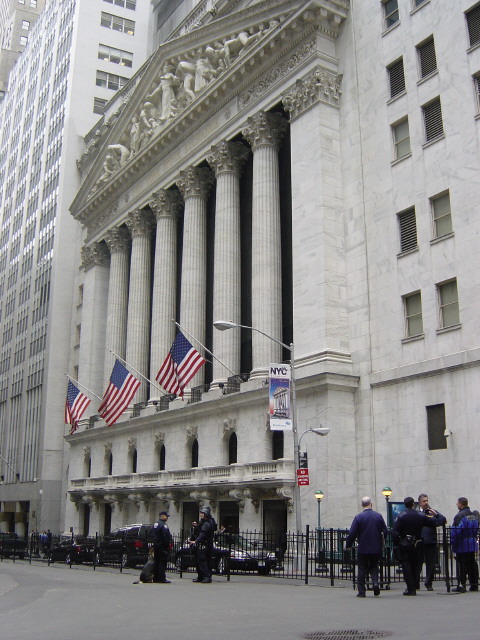 The New York Stock Exchange Although overseas trade has been associated with the development of capitalism for over five hundred years, some thinkers argue that a number of trends associated with globalisation have acted to increase the mobility of people and capital since the last quarter of the twentieth century, combining to circumscribe the room to manoeuvre of states in choosing non-capitalist models of development. Today, these trends have bolstered the argument that capitalism should now be viewed as a truly world system (Burnham). However, other thinkers argue that globalisation, even in its quantitative degree, is no greater now than during earlier periods of capitalist trade.[42] After the abandonment of the Bretton Woods system in 1971, and the strict state control of foreign exchange rates, the total value of transactions in foreign exchange was estimated to be at least twenty times greater than that of all foreign movements of goods and services (EB). The internationalisation of finance, which some see as beyond the reach of state control, combined with the growing ease with which large corporations have been able to relocate their operations to low-wage states, has posed the question of the 'eclipse' of state sovereignty, arising from the growing 'globalization' of capital.[43] While economists generally agree about the size of global income inequality, there is a general disagreement about the recent direction of change of it.[44] In cases such as China, where income inequality is clearly growing[45] it is also evident that overall economic growth has rapidly increased with capitalist reforms.[46] Indur M. Goklany's book The Improving State of the World, published by the libertarian think tank Cato Institute, argues that economic growth since the Industrial Revolution has been very strong and that factors such as adequate nutrition, life expectancy, infant mortality, literacy, prevalence of child labor, education, and available free time have improved greatly.[47] Some scholars, including Stephen Hawking[48] and researchers for the International Monetary Fund,[49][50] contend that globalization and neoliberal economic policies are not ameliorating inequality and poverty but exacerbating it,[51][52][53] and are creating new forms of contemporary slavery.[54][55] Such policies are also expanding populations of the displaced, the unemployed and the imprisoned[56][57] along with accelerating the destruction of the environment[51] and species extinction.[58][59] In 2017, the IMF warned that inequality within nations, in spite of global inequality falling in recent decades, has risen so sharply that it threatens economic growth and could result in further political polarization.[60] Surging economic inequality following the economic crisis and the anger associated with it have resulted in a resurgence of socialist and nationalist ideas throughout the Western world, which has some economic elites from places including Silicon Valley, Davos and Harvard Business School concerned about the future of capitalism.[61] According to the scholars Gary Gerstle and Fritz Bartel, with the end of the Cold War and the emergence of neoliberal financialized capitalism as the dominant system, capitalism has become a truly global order in a way not seen since 1914.[62][63] Economist Radhika Desai, while concurring that 1914 was the peak of the capitalist system, argues that the neoliberal reforms that were intended to restore capitalism to its primacy have instead bequeathed to the world increased inequalities, divided societies, economic crises and misery and a lack of meaningful politics, along with sluggish growth which demonstrates that, according to Desai, the system is "losing ground in terms of economic weight and world influence" with "the balance of international power . . . tilting markedly away from capitalism."[64] Gerstle argues that in the twilight of the neoliberal period "political disorder and dysfunction reign" and posits that the most important question for the United States and the world is what comes next.[62] |
グローバル化 ニューヨーク証券取引所 海外貿易は 500 年以上にわたり資本主義の発展と関連付けられてきたが、一部の思想家は、20 世紀の最後の 25 年間に、グローバル化に伴ういくつかの傾向が、人と資本の流動性を高め、非資本主義的な開発モデルを選択する国家の行動の余地を制限する要因となったと主 張している。現在、これらの傾向は、資本主義を真に世界システムとして捉えるべきだという主張を強化している(バーナム)。しかし、他の思想家は、グロー バル化は、その量的程度においてさえ、資本主義貿易の以前の時期よりも現在の方がより進んでいるわけではないと主張している。[42] 1971年にブレトン・ウッズ体制が放棄され、為替レートの厳格な国家管理が廃止された後、外国為替取引の総額は、すべての外国間の商品およびサービスの 移動額の少なくとも 20 倍に達したと推定されている(EB)。国家の統制の及ばない領域と見なされる金融の国際化と、大企業が低賃金国への事業移転を容易に行えるようになったこ とが、資本の「グローバル化」の進展から生じる「国家主権の衰退」という問題を提起している。[43] 経済学者たちは、世界的な所得格差の大きさについては概ね一致しているが、その最近の変化の方向性については意見が分かれている[44]。中国のように、 所得格差が明らかに拡大しているケース[45]では、資本主義改革に伴い、経済成長が急速に進んだことも明らかだ。[46] リバタリアン系シンクタンクのCato Instituteから出版されたIndur M. Goklanyの著書『The Improving State of the World』は、産業革命以降の経済成長は非常に強く、栄養状態、平均寿命、乳児死亡率、識字率、児童労働の普及率、教育、余暇の確保など、多くの指標が 大幅に改善されたと主張している。[47] スティーブン・ホーキング[48]や国際通貨基金(IMF)の研究者たち[49][50]を含む一部の学者たちは、グローバル化と新自由主義的経済政策は 不平等と貧困を緩和するのではなく、むしろ悪化させている[51][52][53]と主張し、現代の新たな形態の奴隷制を生み出していると指摘している。 [54][55] これらの政策は、環境破壊[51]と種の絶滅[58][59]を加速させる一方で、避難民、失業者、収監者の人口を拡大している[56][57]。 2017年、IMFは、近年グローバルな不平等が減少しているにもかかわらず、国内の不平等が急激に拡大し、経済成長を脅かし、政治的分極化をさらに招く 可能性があると警告した。[60] 経済危機後の経済的不平等拡大とそれに伴う怒りは、西欧世界全体で社会主義やナショナリストの思想の復活を招き、シリコンバレー、ダボス、ハーバード・ビ ジネス・スクールなどの経済エリートの一部は資本主義の未来に懸念を抱いている。[61] 学者ゲイリー・ガースルとフリッツ・バーテルによると、冷戦の終結と、新自由主義的な金融資本主義が支配的なシステムとして台頭したことで、資本主義は 1914年以来見られなかったような、真にグローバルな秩序となった。[62][63] 経済学者のラディカ・デサイは、1914年が資本主義システムの頂点だった点には同意しつつも、資本主義の優位性を回復する目的で実施された新自由主義改 革が、世界にもたらしたのは、格差の拡大、社会の分断、経済危機、貧困、意味のある政治の欠如、そして成長の鈍化であり、 デサイによると、このシステムは「経済的重量と世界影響力において後退している」と指摘し、「国際的な力のバランスは資本主義から著しく離反している」と 述べています。[64] ゲルストルは、新自由主義時代の黄昏期に「政治的混乱と機能不全が支配している」と指摘し、アメリカ合衆国と世界にとって最も重要な問題は「次に何が起こ るか」だと主張しています。[62] |
| 21st century By the beginning of the twenty-first century, mixed economies with capitalist elements had become the pervasive economic systems worldwide. The collapse of the Soviet bloc in 1991 significantly reduced the influence of socialism as an alternative economic system. Leftist movements continue to be influential in some parts of the world, most notably Latin-American Bolivarianism, with some having ties to more traditional anti-capitalist movements, such as Bolivarian Venezuela's ties to Cuba. In many emerging markets, the influence of banking and financial capital have come to increasingly shape national developmental strategies, leading some to argue we are in a new phase of financial capitalism.[65] State intervention in global capital markets following the 2008 financial crisis was perceived by some as signalling a crisis for free-market capitalism. Serious turmoil in the banking system and financial markets due in part to the subprime mortgage crisis reached a critical stage during September 2008, characterised by severely contracted liquidity in the global credit markets posed an existential threat to investment banks and other institutions.[66][67] |
21世紀 21世紀初頭までに、資本主義的要素を含む混合の経済が世界的に普及した経済システムとなった。1991年のソ連圏の崩壊により、代替経済システムとして の社会主義の影響力は大幅に低下した。左翼運動は、世界の一部の地域、特にラテンアメリカのボリバル主義において引き続き影響力を持っており、その一部 は、ボリバル主義のベネズエラとキューバの関係など、より伝統的な反資本主義運動と結びついている。 多くの新興市場では、銀行や金融資本の影響力が国民の開発戦略をますます形作っているため、私たちは金融資本主義の新たな段階にあるとの見方もある。[65] 2008年の金融危機後の世界的な資本市場への国家の介入は、自由市場資本主義の危機を告げるものとの見方もある。サブプライム住宅ローン危機も一因と なった銀行システムと金融市場の深刻な混乱は、2008年9月に危機的な段階に達し、世界的な信用市場の流動性が著しく収縮し、投資銀行やその他の金融機 関の存続を脅かす事態となった。[66][67] |
| Future According to Michio Kaku,[68] the transition to the information society involves abandoning some parts of capitalism, as the "capital" required to produce and process information becomes available to the masses and difficult to control, and is closely related to the controversial issues of intellectual property. Some[68] have further speculated that the development of mature nanotechnology, particularly of universal assemblers, may make capitalism obsolete, with capital ceasing to be an important factor in the economic life of humanity. Various thinkers have also explored what kind of economic system might replace capitalism, such as Bob Avakian, Jason Hickel, Paul Mason, Richard D. Wolff and contributors to the "Scientists' warning on affluence".[69] |
未来 ミチオ・カクによると[68]、情報社会への移行は、情報生産と処理に必要な「資本」が一般大衆が利用可能になり、管理が困難になるため、資本主義の一部 を放棄することと密接に関連しており、知的財産権に関する議論とも深く関わっている。一部[68]では、成熟したナノテクノロジー、特にユニバーサルアセ ンブラーの開発が資本主義を陳腐化させ、資本が人類の経済生活における重要な要因でなくなる可能性がさらに推測されている。ボブ・アヴァキアン、ジェイソ ン・ヒッケル、ポール・メイソン、リチャード・D・ウォルフ、および「豊かさの警告」に寄稿した研究者たち[69]など、さまざまな思想家が、資本主義に 代わる経済システムがどのようなものになるかを探求している。 |
| Role of women Women's historians have debated the impact of capitalism on the status of women.[70][71] Alice Clark argued that, when capitalism arrived in 17th-century England, it negatively impacted the status of women, who lost much of their economic importance. Clark argued that, in 16th-century England, women were engaged in many aspects of industry and agriculture. The home was a central unit of production, and women played a vital role in running farms and in some trades and landed estates. Their useful economic roles gave them a sort of equality with their husbands. However, Clark argued, as capitalism expanded in the 17th century, there was more and more division of labor, with the husband taking paid labor jobs outside the home, and the wife reduced to unpaid household work. Middle-class women were confined to an idle domestic existence, supervising servants; lower-class women were forced to take poorly paid jobs. Capitalism, therefore, had a negative effect on women.[72] By contrast, Ivy Pinchbeck argued that capitalism created the conditions for women's emancipation.[73] Tilly and Scott have emphasized the continuity and the status of women, finding three stages in European history. In the preindustrial era, production was mostly for home use, and women produced many household needs. The second stage was the "family wage economy" of early industrialization. During this stage, the entire family depended on the collective wages of its members, including husband, wife, and older children. The third, or modern, stage is the "family consumer economy", in which the family is the site of consumption, and women are employed in large numbers in retail and clerical jobs to support rising standards of consumption.[74] |
女性の役割 女性史研究者は、資本主義が女性の地位に与えた影響について議論してきた[70][71]。アリス・クラークは、17 世紀に資本主義がイギリスに伝わったことで、経済的に重要な役割の多くを失った女性たちの地位が低下したと主張している。クラークは、16 世紀のイギリスでは、女性は産業や農業のさまざまな分野で活躍していたと主張している。家庭は生産の中心的単位であり、女性は農場の運営や一部の職業、土 地所有地において重要な役割を果たしていた。その経済的な役割は、彼女たちに夫との一種の平等をもたらした。しかし、クラークは、17世紀に資本主義が拡 大するにつれ、労働分業がますます進み、夫は家庭外で有給の労働に従事し、妻は無給の家事労働に追いやられたと主張した。中流階級の女性は、使用人を監督 する怠惰な家庭生活に閉じ込められ、下層階級の女性は低賃金の仕事に就かざるを得なかった。したがって、資本主義は女性に対して否定的な影響を与えた。 [72] これに対し、アイヴィ・ピンチベックは、資本主義が女性の解放の条件を創出したと主張した。[73] ティリーとスコットは、女性の地位の継続性を強調し、ヨーロッパの歴史に3つの段階を見出した。産業革命前の時代には、生産は主に家庭用であり、女性は多 くの家庭用品を生産していた。第二段階は、初期工業化期の「家族賃金経済」だ。この段階では、家族全体が夫、妻、成人した子供を含む家族の総賃金に依存し ていた。第三段階、または現代の段階は「家族消費経済」で、家族が消費の場所となり、女性は小売業や事務職に大量に雇用され、消費水準の向上を支えてい る。[74] |
| 2008 financial crisis Brenner debate Capitalism and Islam Capitalist mode of production Enclosure and British Agricultural Revolution Fernand Braudel History of capitalist theory History of globalization History of private equity and venture capital Primitive accumulation of capital Protestant work ethic Simple commodity production |
2008年の金融危機(リーマン・ブラザーズ倒産) ブレナー論争 資本主義とイスラム教 資本主義的生産方式 囲い込みと英国の農業革命 フェルナン・ブローデル 資本主義理論の歴史 グローバル化の歴史 プライベート・エクイティとベンチャーキャピタルの歴史 資本の原始的蓄積 プロテスタントの労働倫理 単純商品生産 |
| Further reading Appleby, Joyce (2011). The Relentless Revolution: A History of Capitalism. "Italy and the Origins of Capitalism". Business History Review. 94 (1). Spring 2020. Braudel, Fernand (1979), "The Wheels of Commerce", Civilization and Capitalism 15th–18th Century Cheta, Omar Youssef (April 2018). "The economy by other means: The historiography of capitalism in the modern Middle East". History Compass. 16 (4). doi:10.1111/hic3.12444. Comninel, George C. (2000). "English feudalism and the origins of capitalism". Journal of Peasant Studies. 27 (4): 1–53. doi:10.1080/03066150008438748. Hilton, Rodney H., ed. (1976). The Transition from Feudalism to Capitalism. "Blog on the Dobb-Sweezy debate". Leftspot.com. Duplessis, Robert S. (1997). Transitions to Capitalism in Early Modern Europe. Friedman, Walter A. (2017). "Recent trends in business history research: Capitalism, democracy, and innovation". Enterprise & Society. 18 (4): 748–771. Giddens, Anthony (1971). Capitalism and Modern Social Theory: An Analysis of the Writings of Marx, Durkheim and Max Weber. Greene, Julie (April 2020). "Bookends to a Gentler Capitalism: Complicating the Notion of First and Second Gilded Ages". The Journal of the Gilded Age and Progressive Era. 19 (2). Cambridge University Press: 197–205. doi:10.1017/S1537781419000628. Hilt, Eric (June 2017). "Economic History, Historical Analysis, and the 'New History of Capitalism'" (PDF). Journal of Economic History. 77 (2): 511–536. Kocka, Jürgen (2016). Capitalism: A Short History. McCarraher, Eugene (2022). The Enchantments of Mammon: How Capitalism Became the Religion of Modernity. Marx, Karl (1867). Das Kapital. Morton, Adam David (2005). "The Age of Absolutism: capitalism, the modern states-system and international relations". Review of International Studies. 31. Cambridge University Press: 495–517. doi:10.1017/S0260210505006601. Neal, Larry; Williamson, Jeffrey G., eds. (2016). The Cambridge History of Capitalism. Vol. 1–2. Olmstead, Alan L.; Rhode, Paul W. (2018). "Cotton, slavery, and the new history of capitalism" (PDF). Explorations in Economic History. 67: 1–17. Archived from the original (PDF) on 2021-03-08. O'Sullivan, Mary (2018). "The Intelligent Woman's Guide to Capitalism" (PDF). Enterprise & Society. 19 (4): 751–802. Nolan, Peter (2009). Crossroads: The End of Wild Capitalism. Marshall Cavendish. ISBN 978-0-462-09968-2. Patriquin, Larry (2004). "The Agrarian Origins of the Industrial Revolution in England". Review of Radical Political Economics. 36 (2): 196–216. doi:10.1177/0486613404264190. Perelman, Michael (2000). The Invention of Capitalism: Classical Political Economy and the Secret History of Primitive Accumulation. Duke University Press. ISBN 978-0-8223-2491-1. Prak, Maarten; Zanden, Jan Luiten van (2022). Pioneers of Capitalism: The Netherlands 1000–1800. Princeton University Press. Schuessler, Jennifer (6 April 2013). "In History Departments, It's Up With Capitalism". The New York Times. Schumpeter, Joseph A. (1978). Can Capitalism Survive?. Steuart, James Denham (1767). An Inquiry into the Principles of Political Economy. Vol. 3. Weber, Max (2002). The Protestant Ethic and the Spirit of Capitalism. Zmolek, Mike (2000). "The case for Agrarian capitalism: A response to Albritton". Journal of Peasant Studies. 27 (4): 138–59. Zmolek, Mike (October 2001). "DEBATE – Further Thoughts on Agrarian Capitalism: A Reply to Albritton". The Journal of Peasant Studies. 29 (1): 129–154. "Debating Agrarian Capitalism: A Rejoinder to Albritton". Journal of Peasant Studies. 31 (2): 276. "Research in Political Economy, Volume 22". CompuServe. "The Roots of Merchant Capitalism". SmallBusinessPages.org. McCraw, Thomas K. (August 2011). "The Current Crisis and the Essence of Capitalism". The Montreal Review. Łapniewska, Zofia (2014). "History of Capitalism" (PDF). Museum des Kapitalismus. Berlin. |
さらに読む アップルビー、ジョイス(2011)。『容赦なき革命:資本主義の歴史』。 「イタリアと資本主義の起源」。ビジネス・ヒストリー・レビュー。94 (1)。2020年春。 ブラデル、フェルナン(1979)、「商業の車輪」、文明と資本主義 15~18 世紀 チェタ、オマル・ユセフ(2018年4月)。「他の手段による経済:現代中東における資本主義の歴史学」。History Compass. 16 (4). doi:10.1111/hic3.12444. コムニネル、ジョージ・C.(2000)。「英国の封建制度と資本主義の起源」。Journal of Peasant Studies. 27 (4): 1–53. doi:10.1080/03066150008438748. Hilton, Rodney H., ed. (1976). The Transition from Feudalism to Capitalism. 「ドブ・スウィージー論争に関するブログ」。Leftspot.com。 デュプレシス、ロバート S. (1997)。『近世ヨーロッパの資本主義への移行』。 フリードマン、ウォルター A. (2017)。「ビジネス史研究における最近の傾向:資本主義、民主主義、そしてイノベーション」。『エンタープライズ&ソサエティ』。18 (4): 748–771。 ギデンズ、アンソニー (1971)。資本主義と現代社会理論:マルクス、デュルケーム、マックス・ヴェーバーの著作の分析。 グリーン、ジュリー(2020年4月)。「より穏やかな資本主義へのブックエンド:第一と第二の黄金時代の概念の複雑化」。The Journal of the Gilded Age and Progressive Era(黄金時代と進歩主義時代ジャーナル)。19 (2)。ケンブリッジ大学出版局:197–205。doi:10.1017/S1537781419000628。 Hilt, Eric (2017年6月). 「経済史、歴史分析、そして『資本主義の新しい歴史』」 (PDF). Journal of Economic History. 77 (2): 511–536. コッカ、ユルゲン (2016)。資本主義:その短い歴史。 マッカラハー、ユージーン (2022)。マモンの魅力:資本主義が現代性の宗教となった理由。 マルクス、カール (1867)。資本論。 モートン、アダム・デイヴィッド (2005)。「絶対主義の時代:資本主義、近代国家体制、国際関係」。国際研究レビュー。31。ケンブリッジ大学出版局:495–517。doi:10.1017/S0260210505006601。 ニール、ラリー、ウィリアムソン、ジェフリー G.、編(2016)。The Cambridge History of Capitalism. Vol. 1–2. オルムステッド、アラン L.; ロード、ポール W. (2018). 「綿、奴隷制、そして資本主義の新しい歴史」 (PDF). 経済史の探求. 67: 1–17. 2021年3月8日にオリジナル (PDF) からアーカイブ。 オサリバン、メアリー (2018). 「資本主義の賢い女性のためのガイド」 (PDF). エンタープライズ&ソサエティ. 19 (4): 751–802. ノーラン、ピーター (2009). 岐路:野生の資本主義の終焉. マーシャル・キャベンディッシュ. ISBN 978-0-462-09968-2。 パトリキン、ラリー (2004). 「イギリス産業革命の農業的起源」. Review of Radical Political Economics. 36 (2): 196–216. doi:10.1177/0486613404264190. ペレルマン、マイケル(2000)。『資本主義の発明:古典政治経済学と原始的蓄積の秘密の歴史』。デューク大学出版局。ISBN 978-0-8223-2491-1。 プラク、マーテン;ザンデン、ヤン・ルイテン・ファン(2022)。『資本主義のパイオニア:オランダ 1000–1800』。プリンストン大学出版局。 シュレスラー、ジェニファー (2013年4月6日)。「歴史学部では、資本主義が台頭している」。ニューヨーク・タイムズ。 シュンペーター、ジョセフ・A. (1978)。資本主義は生き残ることができるか? スチュアート、ジェームズ・デナム (1767)。政治経済学の原理に関する考察。第 3 巻。 ヴェーバー、マックス (2002)。『プロテスタントの倫理と資本主義の精神』。 Zmolek, Mike (2000). 「農業資本主義の主張:アルブリットンへの反論」 『Journal of Peasant Studies』 27 (4): 138–59. Zmolek, Mike (2001年10月). 「討論 – 農業資本主義に関するさらなる考察:アルブリットンへの反論」。農民研究ジャーナル。29 (1): 129–154. 「農業資本主義に関する討論:アルブリットンへの反論」。農民研究ジャーナル。31 (2): 276. 「政治経済学の研究、第 22 巻」。CompuServe. 「商人資本主義のルーツ」。SmallBusinessPages.org。 マックロー、トーマス・K.(2011年8月)。「現在の危機と資本主義の本質」。モントリオール・レビュー。 Łapniewska、ゾフィア(2014)。「資本主義の歴史」(PDF)。資本主義博物館。ベルリン。 |
| https://en.wikipedia.org/wiki/History_of_capitalism |
●トマ・ピケティ『21世紀の資本』——日本語のウィキペディア、英語のそれの翻訳を示す
| 『21世紀の資本』(21せいきのしほん、仏: Le Capital au XXIe
siècle)とは、フランスの経済学者であるトマ・ピケティの著書。 2013年にフランス語で公刊され、2014年4月には英語訳版(英: Capital in the Twenty-First Century)が発売されるや、Amazon.comの売上総合1位に輝くなど大ヒットした[3]。アメリカ合衆国では2014年春の発売以降、半年で 50万部のベストセラーとなっており、多くの言語で翻訳されている[4]。2015年1月現在、世界10数カ国で累計100万部を突破し[5]、世界的な ベストセラーとなった[6]。 長期的にみると、資本収益率(r)は経済成長率(g)よりも大きい。資本から得られる収益率が経済成長率を上回れば上回るほど、それだけ富は資本家へ蓄積 される。そして、富が公平に再分配されないことによって、貧困が社会や経済の不安定を引き起こすということを主題としている。この格差を是正するために、 累進課税の富裕税を、それも世界的に導入することを提案している。 日本での版権を持つみすず書房は、日本語版 (ISBN 978-4-622-07876-0) を2014年(平成26年)12月8日に出版した[1][7]。それ以前の紹介では『21世紀の資本論』(21せいきのしほんろん)と表記したものが多い [8]。2015年1月現在、日本語版は定価5,500円(消費税別)にもかかわらず、売上部数が13万部に迫っている[5]。 2019年にマシュー・メトカルフ製作、ジャスティン・ペンバートン(英語版)監督で映画化された[9]。 |
|
| 本書の内容 資本主義の特徴は、資本の効率的な配分であり、公平な配分を目的としていない。そして、富の不平等は、干渉主義(富の再分配)を取り入れることで、解決す ることができる。これが、本書の主題である[10]。資本主義を作り直さなければ、まさに庶民階級そのものが危うくなるだろう[10]。 議論の出発点となるのは、資本収益率(r)と経済成長率(g)の関係式である。rとは、利潤、配当金、利息、貸出料などのように、資本から入ってくる収入 のことである。そして、gは、給与所得などによって求められる。 過去200年以上のデータを分析すると、資本収益率(r)は平均で年に5%程度であるが、経済成長率(g)は1%から2%の範囲で収まっていることが明ら かになった[11]。このことから、経済的不平等が増していく基本的な力は、r>g という不等式にまとめることができる。 すなわち、資産によって得られる富の方が、労働によって得られる富よりも速く蓄積されやすいため、資産金額で見たときに上位10%、1%といった位置にい る人のほうがより裕福になりやすく、結果として格差は拡大しやすい。また、この式から、次のように相続についても分析できる。すなわち、蓄積された資産 は、子に相続され、労働者には分配されない。 たとえば、19世紀後半から20世紀初頭にかけてのベル・エポックの時代は、華やかな時代といわれているが、この時代は資産の9割が相続によるものだっ た。また、格差は非常に大きく、フランスでは上位1%が6割の資産を所有していた[11][12]。 一方で、1930年から1975年のあいだは、いくつかのかなり特殊な環境によって、格差拡大へと向かう流れが引き戻された。特殊な環境とは、つまり2度 の世界大戦や世界恐慌のことである。そして、こうした出来事によって、特に上流階級が持っていた富が、失われたのである[13]。また、戦費を調達するた めに、相続税や累進課税の所得税が導入され、富裕層への課税が強化された[14][15]。さらに、第二次世界大戦後に起こった高度成長の時代も、高い経 済成長率(g)によって、相続などによる財産の重要性を減らすことになった[13][16]。 しかし、1970年代後半からは、富裕層や大企業に対する減税などの政策によって、格差が再び拡大に向かうようになった[17][18]。そしてデータか ら、現代の欧米は「第二のベル・エポック」に突入し、中産階級は消滅へと向かっていると判断できる[19]。 つまり、今日の世界は、経済の大部分を相続による富が握っている「世襲制資本主義」に回帰しており、これらの力は増大して、寡頭制を生みだす[20]。 また、今後は経済成長率が低い世界が予測されるので、資本収益率(r)は引き続き経済成長率(g)を上回る。そのため、何も対策を打たなければ、富の不平 等は維持されることになる[21]。科学技術が急速に発達することによって、経済成長率が20世紀のレベルに戻るという考えは受け入れがたい。我々は「技 術の気まぐれ」に身を委ねるべきではない[13]。 不平等を和らげるには、最高税率年2%の累進課税による財産税を導入し、最高80%の累進所得税と組み合わせればよい[13]。その際、富裕層が資産を タックス・ヘイヴンのような場所に移動することを防ぐため、この税に関して国家間の国際条約を締結する必要がある。しかし、このような世界的な課税は、夢 想的なアイディアであり、実現は難しい[19]。 |
|
| 特徴 フランス語版は、総ページ数950ページ以上、厚さ44ミリメートルという大部である。英語版は、活字を小さくするなどの変更を施したが、それでもページ 数は700ページ近くになる[22]。 特徴的なのは、200年以上の膨大な資産や所得のデータを積み上げて分析したことで、それが本書を長大なものにしている[23][24]。ピケティは、こ のビッグデータを収集、分析するのに15年の歳月を費やした[23][25]。ローレンス・サマーズは、「この統計データだけで、ノーベル賞に値する」と 述べている[26]。使用された全てのデータ・グラフ・表は、ウェブサイトで公開されており、フランス語・英語・日本語で参照できる[8]。 内容面での特徴としては『アメリカン・ドリームの否定』が挙げられる。すなわち、アメリカ合衆国では、生まれが貧しくても努力することで、出世し裕福にな れると信じられていたが、ピケティは、現在のアメリカ合衆国は他国と比べてそのような流動性は高くないことを実証した。さらに、大学への入学においても、 両親の経済力が大いに物を言うことを指摘している[27][28]。 さらに、ピケティは、サイモン・クズネッツの仮説『クズネッツ曲線』をも否定している。クズネッツの仮説とは、クズネッツ曲線で「逆U字型仮説」と呼ばれ るもので、「資本主義経済では経済成長の初期には格差が拡大するが、その後格差は縮小に向かう」という仮説である。実際、クズネッツがこの仮説を発表した 1955年の時点では、格差は縮小していた。しかし、ピケティは、1980年代になると格差が再び拡大していることを示した。ピケティは、クズネッツの仮 説について「冷戦時代に共産主義に対抗するために作られたものにすぎない」と述べている[29][11]。 一般的な経済論文とは異なり、この本には、数式は殆ど登場しない[26]。代わりに、オノレ・ド・バルザック、ジェーン・オースティン、ヘンリー・ジェイ ムズの小説などを引用して、19世紀初期のイギリスやフランスに存在した、相続財産によって固定された階級を説明している[13][30]。たとえば、バ ルザックの『ゴリオ爺さん』では、登場人物が、裁判官や弁護士、検事として働くのと、銀行家の娘と結婚するのとでは、どちらが早く富を得られるかについて 語る場面を紹介している。そしてピケティは、その時代の歴史データを分析し、銀行家と結婚した方が、早く富を得られることを実証している[31]。 『21世紀の資本論』という書名は、カール・マルクスの『資本論』を思い起こさせる。実際、ビジネスウィーク誌での特集の書き出しは、「一匹の妖怪が、 ヨーロッパとアメリカを徘徊している。富裕層という妖怪が」という、マルクスの『共産党宣言』を意識した記述で始まっており[32]、ピケティを批判する 人の中には、彼を共産主義者だと言う声もある[33][34][35][36]。しかし、ピケティは『ニュー・リパブリック』誌とのインタビューにおい て、『資本論』は難解であまり影響を受けていないと述べており[37]、資本主義も否定していない[38]。 |
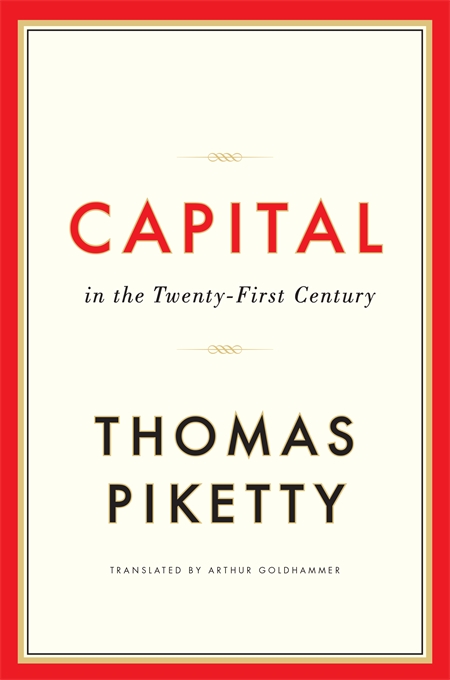 英訳 英訳 |
| 出版と当初の反応 2013年8月に、フランスで最初に出版されたときは、あまり注目されていなかった[32][39]。しかし、発売後は1週間で6,000部を売り上げた [22]。ローラン・モデュイは「政治的思想的ブルドーザー」と喩え[40][41]、週刊誌レクスプレス(英語版)は「経済問題はフランス人を熱中させ る」と報じた[22]。 本書の主題がニュースとして英語圏に広がると、『エコノミスト』は「権威ある」と称して歓迎した[42]。ポール・クルーグマンは本書を「画期的」と呼び [43]、元世界銀行のリードエコノミストであるブランコ・ミラノヴィッチ(英語版)は、「経済の考えにおいて分岐点となる本の1つ」ととらえた [44]。 フランス語版の書評が、広く興奮を引き起こしたのに応えて、英語への翻訳は急ピッチで進められ、ハーバード大学出版は発売日を前倒しし、2014年5月と した。アメリカ合衆国ではその日、本書は一夜にしてスターになり[45]、マイケル・ルイスの『フラッシュ・ボーイズ(英語版)』から全米ベストセラーリ スト1位の座を奪い取った[46]。同年、ステファニー・ケルトンは「ピケティ現象」について語り[47]、ドイツでも、ピケティに関する書籍が3冊出版 された[48][49][50]。今後、31の言語への翻訳が予定されている[39]。 |
|
| 評価 ノーベル経済学賞受賞者のポール・クルーグマンは本書を「素晴らしい」「不平等についての考え方を一新するもの」[51]さらには「今年、そしておそらく この10年間で最も重要な経済書」と称している[20]。彼は本書を、ベストセラーになった他の経済書と比較して、「重大で、これまでとは異なる研究方 法」で成り立っている点が異なるとしている[52]。また、次のようにも述べている。 富や収入が、少数の人の手に集まっていることが、中央政府の課題として再び問題視される様になってきたとき、ピケティは歴史的に見て、一体どんなおかしな ことが起きているかについて、資料を出して教えてくれるだけではない。彼はまた、不平等問題、すなわち平等な経済成長、資本家と労働者の所得の分配、個々 人の間での富と収入の分配、といった「問題の統一的な理論」となるものをも提示しているのだ。 『21世紀の資本』は、あらゆる面でとてつもなく重要である。ピケティは、我々の経済言説を変えてしまった。我々はもはや、かつてのような切り口で、富や 不平等について語ることなど決してないであろう[51]。 — ポール・クルーグマン ノーベル経済学賞の受賞歴があるロバート・ソローは、 ピケティは、古い主題に対して新しく力強い貢献をした。それは、利益率が経済成長率を上回っている限り、金持ちの収入と富は、普通に働いている人の収入よ りも増加しやすいということである。 — ロバート・ソロー と評している[53]。 フランスの歴史学者・政治学者のエマニュエル・トッドは本書を「傑作」と呼び、「経済学にとっても、地球社会の発展にとっても影響力の大きい本」と評して いる[54]。また、ピケティについて、「アナール学派を代表する最良の歴史家として記憶されるだろう」と評価している[55]。 ジョセフ・スティグリッツは、格差は資本主義固有の問題だという見方は本書の表面的な評価に過ぎないとして、それに加えて、本書について格差が拡大したこ とについての制度的な分析という点から評価を加えている[56]。 ローレンス・サマーズは、ピケティが集計した統計については評価したが、一方で、ピケティは資本から得られる見返りが減少することについて過小評価してい ると批判している。すなわち、サマーズの考えによれば、資本を増やすことによって得られる利益は少なくなってゆくものであるから(収穫逓減の法則)、不平 等の拡大には上限があるということになる。さらにサマーズは、ピケティのもう1つの仮定にも疑問を投げかけている。それは、利益の多くは再投資に回るとい うものである。貯蓄率が低下することになるため、これに関しても社会的には不平等の上限というものが存在することになる[57]。 また、サマーズは、1982年におけるアメリカの富裕者上位に名を連ねていた400人のうち、2012年にもその地位を維持していたのはわずか10人に1 人だった事も指摘している。富裕者層の財産は増加していない。さらに、富裕者上位1%の収入は現在大半が給与所得であり、資本から得られる収入ではない。 他の多くの経済評論家は上位1%の収入の増加をグローバリゼーションと技術革新で説明している[58][59]。 マルクス主義者であり批判地理学の研究者であるデヴィッド・ハーヴェイは、「自由市場型資本主義(free market capitalism)によって皆が豊かになった、それは個人の自由と権利を守る偉大な防波堤だ、などという広くいわれている見解」を本書が覆したという 面では評価しているが、他の面に関しては総じて批判的である。ピケティの「資本」(Capital)の定義について、ハーヴェイは次のように記している。 ピケティは資本(capital)というものを、個人、企業、政府が所有するあらゆる資産(asset)からなるストックと定義しており、そして、それが 使用されようと使用されまいと、市場で取引することができるものと定義している。 これには土地、不動産、知的財産権、そして私〔ハーヴェイ〕の〔所有する〕アートや宝石類のコレクションが含まれている。 これらすべてのものの価値を決定するのは複雑で難しい問題であり、解決策において合意は存在しない。 — デヴィッド・ハーヴェイ ハーヴェイは、ピケティの「不平等を是正するための提案は、空想的とまでは言わないにせよ、考えが甘い。しかもピケティは、21世紀における資本について の実用的なモデルというものを少しも作りだしていない。だから我々にはまだマルクスか、あるいはその現代版が必要なのだ」と述べている。ハーヴェイはピケ ティがマルクスの『資本論』を読まずに退けていることを批判している。また、ピケティの考え方の根底には新古典派経済学があることを指摘している[注釈 1][61]。(実際、ピケティは本書の中でケンブリッジ資本論争(英語版)について言及し、J. ロビンソン、カルドアたちポスト・ケインズ派側ではなく、新古典派側に軍配を上げている[62]。) ジョージ・メイソン大学教授のタイラー・コーエンは「資本家を『金利生活者』のように扱っているが、収益を得るための様々なリスクについては触れられてい ない」と非難している[63]。 格差の拡大を解消するための財産税(富裕税)については、ピケティ自身も実現の可能性はないと述べているが、批判が多い。アラン・グリーンスパンは、「そ れは資本主義のやり方ではない」と述べ[64]、タイラー・コーエンも、この税を導入すれば政治や経済が不安定になると述べている[65]。コロンビア大 学教授のウォジシェック・コップザックとエコノミストのアリソン・シュレージャーは、富裕者は資産をオフショアのタックス・ヘイヴンに移動することもでき ることを指摘し、また、富裕層はいろいろな手法を使って、他の人々よりも多くの投資配当を得ることが多いので、富裕税は格差の縮小につながらす、また、格 差を縮小したいのであれば、富よりも資本所得に課税する方が好ましいとしている[66]。 日本語版の翻訳を担当している山形浩生は、本書に書かれている内容はとても単純なことだが、それをデータで裏付けできるようにしたことが優れていると評し ている[24]。 中野剛志は、本書の主張は欧米などで主流の「新自由主義を支持する人々」にとって、不都合な内容であると指摘している[67]。そのため、こうした内容の 本がアメリカ合衆国で「ベストセラーになること」は驚くべき現象であって、アメリカ合衆国において30年以上続いた新保守主義の支配が終わりを迎えようと していることを意味すると述べている[68]。 岩井克人(東京大学名誉教授)は、著書「経済学の宇宙」(2015年)で「21世紀の資本」には誤りがあるが、詳細は後日論じるとしていた。具体的な説明 は、日本経済新聞「経済教室」(2016年8月9日火曜日)に掲載された。 私はピケティ氏の仕事を尊敬しているが、以上(ピケティ氏)の議論には誤りがあると思う。資本の成長率はrではなく、貯蓄率sをかけた「s×r」であるか ら、r>gではなく、s×r>gという不等式が成り立つことが、資本家に所得や富が集中する条件であるが、実際には、s×r<gであり、条件を満たさな い。 — 岩井克人 としている。 |
|
| データエラー問題 2014年5月23日、フィナンシャル・タイムズの経済記者であるクリス・ジャイルズは、ピケティのデータの中で、特に「富の不平等が1970年代以降拡 大している」という箇所に「説明できないエラー」を確認したと発表した[69][70][71][72][73]。 ここ数週間のベストセラーリストを席巻しているピケティ教授の577ページからなる本は、土台となるデータに、彼の研究結果をゆがめることになる幾つかの 誤りが含まれている。フィナンシャル・タイムズは、ピケティの集計表に誤りと説明のつかない入力内容を発見した。これは昨年名声を損ねることになったカー メン・ラインハートとケネス・ロゴフによる公的債務と成長率に関する論文[注釈 2]と似たような事例である。 ピケティ教授の本で書かれている主要テーマは、富の不平等が「第一次世界大戦前の水準まで上昇する」ということである。今回の調査は、この主張の価値を低 下させることになる。というのも、この調査で、ピケティ論文の参照元には、富の総量が増えた分の分け前は「少数の金持ちの手に渡る」という彼の主張を裏付 ける証拠が、殆ど書かれていないことが分かったからである[74]。 — フィナンシャル・タイムズ ピケティは自分の研究結果は正しいと反論し、そして、その後の研究でも「富の不平等が拡大している」という自分の結論は裏付けられている(ピケティはエマ ニュエル・サエズとガブリエル・ザックマン(ドイツ語版)による発表The Distribution of US Wealth, Capital Income and Returns since 1913を引いている)、実際問題として、アメリカ合衆国では、本に書いた以上の不平等の拡大が見られていると主張した[75]。 フランス通信社のインタビューでは、フィナンシャル・タイムズの記事を「真実味の無い批判」と責め、同紙について、「馬鹿げたものだ。この時代に生きる全 ての人が、巨大な財産が益々大きくなっている事に気付いているというのに」と述べている[76]。 フィナンシャル・タイムズの告発は各紙で広く取り上げられた。幾つかの記事では、フィナンシャル・タイムズは事を大げさに述べていると報じた。例えば、 フィナンシャル・タイムズの姉妹誌であるエコノミストは次のように書いている。 ジャイルズ氏の分析には心動かされるものがある。この先、ジャイルズ氏、ピケティ氏、あるいは他の誰かによる追加調査で、間違いがあったかどうか、どのよ うにしてこれを発表するに到ったのか、効果は何なのかをはっきりさせることを強く望む。ジャイルズ氏が提供した資料を見る限りでは、しかし、資料はフィナ ンシャル・タイムズによる主張の多くを支持しているようには思えないし、『21世紀の資本』における議論が間違いだと結論付けられるとも思えない [77]。 — エコノミスト ピケティは1つ1つの反証をウェブサイト (PDF) で公開している[78]。 日本語版の翻訳を担当している山形浩生は、フィナンシャル・タイムズの批判は、税務に基づくデータに最近だけは自主申告の家計サーベイデータを繋ぐという 手法を使っており、種類の違うデータを繋ぐというやり方がそもそも問題で、家計サーベイのデータはみんな過少申告するのが通例であてにならない。このメイ ンの批判が論破されてしまったので、このフィナンシャル・タイムズによる批判はほぼ総崩れで、もはや批判として紹介するにも値しない、と述べている [79]。 |
|
| https://x.gd/40vD8 |
|
| Capital in the Twenty-First Century
(French: Le Capital au XXIe siècle) is a book written by French
economist Thomas Piketty. It focuses on wealth and income inequality in
Europe and the United States since the 18th century. It was first
published in French (as Le Capital au XXIe siècle) in August 2013; an
English translation by Arthur Goldhammer followed in April 2014.[1] The book's central thesis is that when the rate of return on capital (r) is greater than the rate of economic growth (g) over the long term, the result is concentration of wealth, and this unequal distribution of wealth causes social and economic instability. Piketty proposes a global system of progressive wealth taxes to help reduce inequality and avoid the vast majority of wealth coming under the control of a tiny minority. At the end of 2014, Piketty released a paper where he stated that he does not consider the relationship between the rate of return on capital and the rate of economic growth as the only or primary tool for considering changes in income and wealth inequality. He also noted that r > g is not a useful tool for the discussion of rising inequality of labor income.[2] On May 18, 2014, the English edition reached number one on The New York Times Best Seller list for best selling hardcover nonfiction[3] and became the greatest sales success ever of academic publisher Harvard University Press.[4] As of January 2015, the book had sold 1.5 million copies in French, English, German, Chinese, and Spanish.[5] The book has been adapted into a feature documentary film, directed by New Zealand filmmaker Justin Pemberton.[6] |
『21世紀の資本』(仏: Le
Capital au XXIe siècle)
は、フランスの経済学者トマ・ピケティの著書である。18世紀以降のヨーロッパとアメリカにおける富と所得の不平等に焦点を当てている。本書は2013年
8月にフランス語版(Le Capital au XXIe
siècle)として出版され、2014年4月にはアーサー・ゴールドハマーによる英訳版が出版された[1]。 本書の中心的なテーゼは、資本収益率(r)が長期的に経済成長率(g) よりも大きい場合、結果として富が集中し、この富の不平等な分配が社会的・経済的不安定を引き起こすというものである。ピケティは、不平等 を是正し、大多数の富がごく少数の支配下に置かれることを避けるために、累進的な富裕税の世界的なシステムを提案している。 2014年末、ピケティは論文を発表し、資本収益率と経済成長率の関係を、所得と富の不平等の変化を考察するための唯一または主要な手段とは考えていない と述べた。また、r>gは労働所得の不平等上昇の議論に有用なツールではないとも述べている[2]。 2014年5月18日、英語版はニューヨーク・タイムズ紙のベストセラー・リストでハードカバーのノンフィクションのベストセラー第1位となり[3]、学 術出版社であるハーバード大学出版局の過去最大の売上を記録した[4]。 2015年1月現在、同書はフランス語、英語、ドイツ語、中国語、スペイン語で150万部を売り上げている[5]。 この本は、ニュージーランドの映画監督ジャスティン・ペンバートンによって長編ドキュメンタリー映画化された[6]。 |
| Publication and initial reception When first published in French in August 2013, Laurent Mauduit characterized it as "a political and theoretical bulldozer".[7][8] As news spread of its thesis in the English-speaking world, Paul Krugman hailed it as a landmark,[9] while former senior World Bank economist Branko Milanović considers it "one of the watershed books in economic thinking".[10] In response to widespread curiosity abroad aroused by reviews of the original French edition published by Seuil in September 2013, it was translated rapidly into English and its publication date was pushed forward to March 2014 by Belknap. It proved an overnight sensation[11] and ousted Michael Lewis's financial exposé, Flash Boys: Cracking the Money Code, from the top of the US best-seller list.[12] Within a year of its publication, Stephanie Kelton spoke of a "Piketty phenomenon",[13] and in Germany three books had been published specifically dealing with Piketty's critique.[14][15][16] |
出版と最初の評判 2013年8月にフランス語で初めて出版されたとき、ローラン・モーデュイはこの本を「政治的かつ理論的なブルドーザー」と評した[7][8]。英語圏で この論文のニュースが広まるにつれ、ポール・クルーグマンはこの本を画期的なものとして称賛し[9]、元世界銀行上級エコノミストのブランコ・ミラノ ヴィッチはこの本を「経済思想における分水嶺の1冊」とみなしている[10]。 [10]2013年9月にSeuilから出版されたフランス語版のレビューによって海外に広まった好奇心に応えて、この本は急速に英語に翻訳され、ベル ナップによって出版日が2014年3月に前倒しされた。一夜にしてセンセーションを巻き起こし[11]、マイケル・ルイスの金融暴露本『フラッシュ・ボー イズ』を追い落とした: 出版から1年も経たないうちに、ステファニー・ケルトンは「ピケティ現象」について語り[13]、ドイツではピケティの批評を扱った3冊の本が出版された [14][15][16]。 |
| Contents The central thesis of the book is that inequality is not an accident, but rather a feature of capitalism and can only be reversed through state interventionism.[17] The book thus argues that, unless capitalism is reformed, the very democratic order will be threatened.[17] Piketty bases his argument on a formula that relates the rate of return on capital (r) to economic growth (g), where r includes profits, dividends, interest, rents, and other income from capital and g is measured as growth of society's income or output. He argues that when the rate of growth is low, then wealth tends to accumulate more quickly from r than from labor and tends to accumulate more among the top 10% and 1%, increasing inequality. Thus, the fundamental force for divergence and greater wealth inequality can be summed up in the inequality r > g. He analyzes inheritance from the perspective of the same formula. 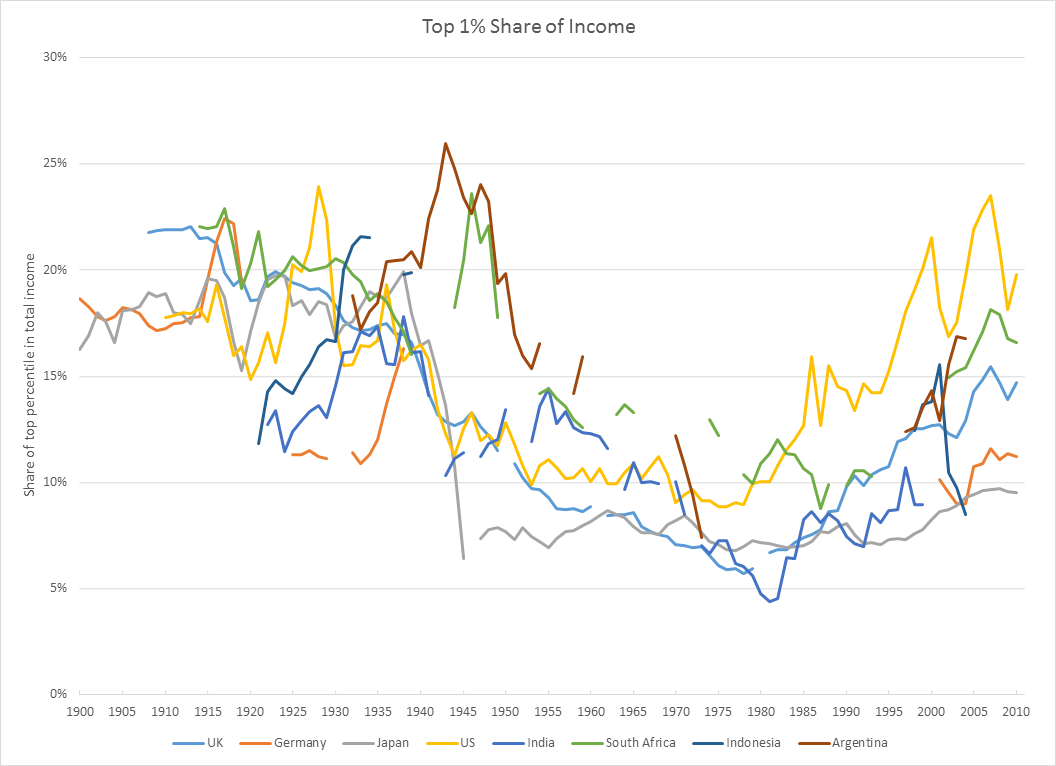 Income inequality as measured by the income of the top 1% in several countries. Inequality tended to drop in the middle of the century but has increased in the past several decades. The book argues that there was a trend towards higher inequality that was reversed between 1930 and 1975 due to unique circumstances: the two world wars, the Great Depression, and a debt-fueled recession destroyed much wealth, particularly that owned by the elite.[18] These events prompted governments to undertake steps towards redistributing income, especially in the post–World War II period. The fast, worldwide economic growth of that time began to reduce the importance of inherited wealth in the global economy.[18] The book argues that the world today is returning towards "patrimonial capitalism", in which much of the economy is dominated by inherited wealth: the power of this economic class is increasing, threatening to create an oligarchy.[19] Piketty cites novels by Honoré de Balzac, Jane Austen, and Henry James[18] to describe the rigid class structure based on accumulated capital that existed in England and France in the early 1800s. Piketty proposes that a progressive annual global wealth tax of up to 2%, combined with a progressive income tax reaching as high as 80%, would reduce inequality,[18] although he says that such a tax "would be politically impossible".[20] 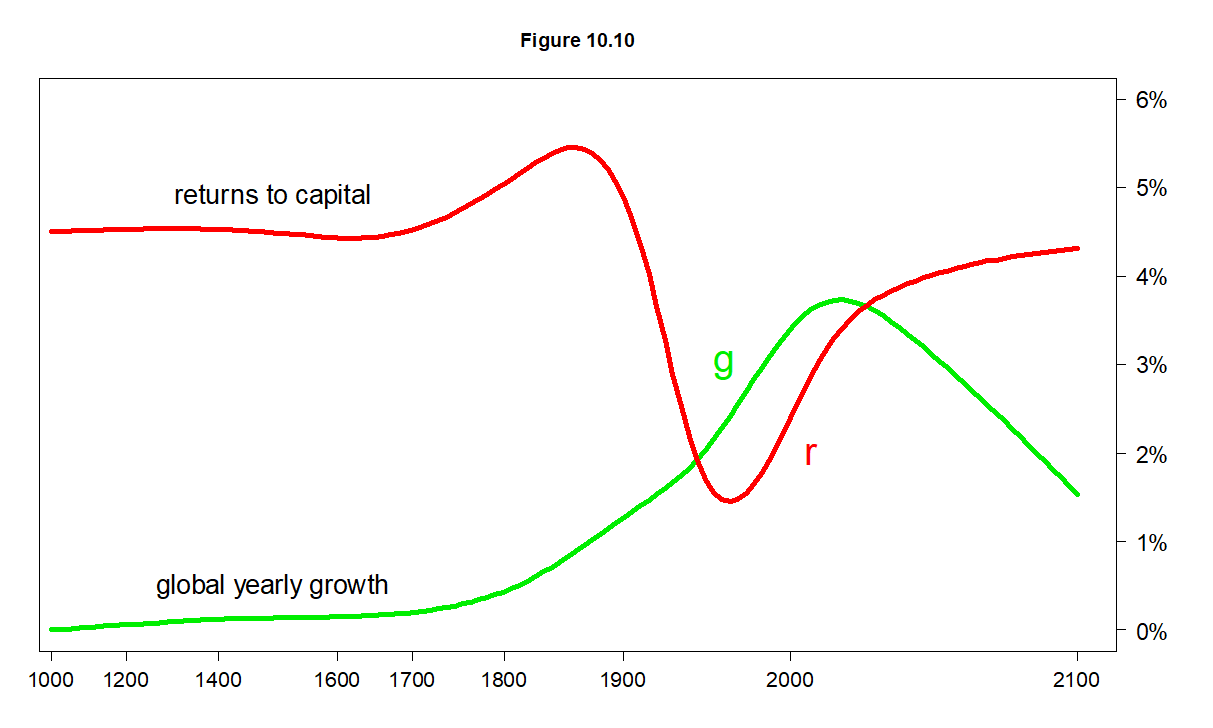 Piketty believes the growth rate will once again fall below the rate of return, and the twentieth century will be an aberration in terms of inequality.[21] Without tax adjustment, Piketty predicts a world of low economic growth and extreme inequality. His data show that over long periods of time, the average return on investment outpaces productivity-based income by a wide margin.[18] He dismisses the idea that bursts of productivity resulting from technological advances can be relied on to return sustained economic growth; we should not expect "a more just and rational order" to arise based on "caprices of technology",[18] and return on investment can increase when technology can be substituted for people.[20] |
目次 本書の中心的なテーゼは、不平等は偶然ではなく、むしろ資本主義の特徴であり、国家介入主義によってのみ逆転させることができるというものである [17]。したがって本書は、資本主義が改革されない限り、民主主義秩序そのものが脅かされると主張している[17]。 ピケティは、資本収益率(r)と経済成長率(g)を関係づける公式に基づいて議論を展開している。rには利益、配当、利子、賃料、その他資本からの所得が 含まれ、gは社会の所得または生産高の成長として測定される。彼は、成長率が低い場合、富は労働からよりもrからより早く蓄積される傾向があり、上位 10%と1%の間でより多く蓄積される傾向があり、不平等を増大させると主張している。従って、乖離と富の不平等の拡大をもたらす根本的な力は、不等式 r>gに集約される。  いくつかの国の上位1%の所得で測定した所得不平等。不平等は今世紀半ばには低下する傾向にあったが、過去数十年で上昇している。 本書は、1930年から1975年の間に不平等が拡大する傾向があったが、それが逆転したのは特殊な事情があったからだと論じている。2つの世界大戦、世 界大恐慌、債務に起因する不況が、特にエリート層が所有していた多くの富を破壊したのである[18]。当時の急速で世界的な経済成長は、世界経済における 継承された富の重要性を低下させ始めた[18]。 ピケティは、オノレ・ド・バルザック、ジェーン・オースティン、ヘンリー・ジェイムズ[18]の小説を引用し、1800年代初頭のイギリスとフランスに存 在した、蓄積された資本に基づく硬直した階級構造を描写している。 ピケティは、最大2%の累進的な年間富裕税と80%にも達する累進的な所得税を組み合わせることで、不平等を是正できると提案している[18]が、そのよ うな税制は「政治的に不可能だろう」と述べている[20]。  ピケティは、成長率は再び収益率を下回り、不平等という点では20世紀は異常なものになると考えている[21]。 税制調整がなければ、ピケティは低経済成長と極端な不平等の世界を予測する。ピケティは、技術の進歩による生産性の爆発が持続的な経済成長をもたらすとい う考えを否定している。「技術の気まぐれ」に基づいて「より公正で合理的な秩序」が生まれることを期待すべきではなく[18]、技術が人の代わりになるこ とで投資収益率が上昇する可能性がある[20]。 |
| Reception The book's exceptional success was widely attributed to "being about the right subject at the right time", as The Economist put it. Piketty himself recognized there is a common sense that "inequality and wealth in the United States have been widening." The Occupy movement's "We are the 99%" slogan made talk of inequality "the zeitgeist of our age – an age of seemingly permanent crisis and austerity," as Adam Booth put it.[22] British author Paul Mason dismissed charges of "soft Marxism" as "completely misplaced", noting that Marx described social relations trying to unveil capitalism's inner tendencies, where Piketty solely relies on social categories and historical data. Piketty rather "placed an unexploded bomb within mainstream, classical economics," he concludes.[23] Other scholars have built upon Piketty's work, such as historian Walter Scheidel, who concurs with Piketty in his own study of inequality (The Great Leveler, 2017) that the gap will continue to widen as the decades pass but contends that Piketty's solutions are untenable.[24] Praise 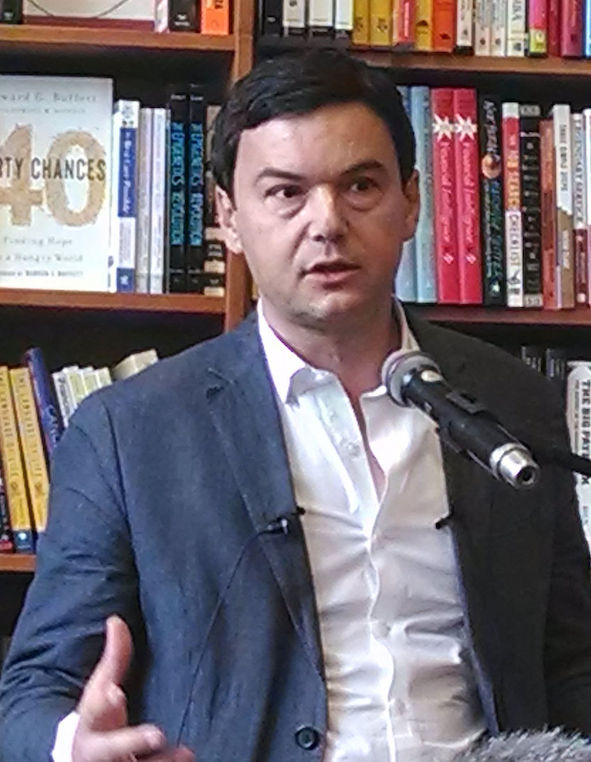 The author Thomas Piketty Paul Krugman called the book a "magnificent, sweeping meditation on inequality"[25] and "the most important economics book of the year – and maybe of the decade."[19] He distinguishes the book from other bestsellers on economics as it constitutes "serious, discourse-changing scholarship".[26] Krugman also wrote:[25] At a time when the concentration of wealth and income in the hands of a few has resurfaced as a central political issue, Piketty doesn't just offer invaluable documentation of what is happening, with unmatched historical depth. He also offers what amounts to a unified field theory of inequality, one that integrates economic growth, the distribution of income between capital and labor, and the distribution of wealth and income among individuals into a single frame. ... Capital in the Twenty-First Century is an extremely important book on all fronts. Piketty has transformed our economic discourse; we'll never talk about wealth and inequality the same way we used to. Steven Pearlstein called it a "triumph of economic history over the theoretical, mathematical modeling that has come to dominate the economics profession in recent years", but also added: "Piketty's analysis of the past is more impressive than his predictions for the future are convincing."[18] Branko Milanović, a former senior economist at the World Bank, called the book "one of the watershed books in economic thinking."[27][28] British historian Andrew Hussey called the book "epic" and "groundbreaking" and argues that it proves "scientifically" that the Occupy movement was correct in its assertion that "capitalism isn't working".[29] According to Robert Solow, Piketty has made a "new and powerful contribution to an old topic: as long as the rate of return exceeds the rate of growth, the income and wealth of the rich will grow faster than the typical income from work".[30] French historian and political scientist Emmanuel Todd called Capital in the Twenty-First Century a "masterpiece" and "a seminal book on the economic and social evolution of the planet".[31] The book has been described as "a political and theoretical bulldozer" in the French press.[32] The Economist wrote: "A modern surge in inequality has new economists wondering, as Marx and Ricardo did, which forces may be stopping the fruits of capitalism from being more widely distributed. Capital in the Twenty-First Century ... is an authoritative guide to the question."[33] Will Hutton wrote: "Like Friedman, Piketty is a man for the times. For 1970s anxieties about inflation substitute today's concerns about the emergence of the plutocratic rich and their impact on economy and society. ... the current level of rising wealth inequality, set to grow still further, now imperils the very future of capitalism. He has proved it."[34] Clive Crook, while being strongly critical of the book, described it as earning more praise than any other economics book in decades. He suggests it was "greeted with... erotic intensity" because of a demand for "scholarly respectability" that would affirm the belief that inequality is, quoting John Cassidy, "the defining issue of our era".[35][10] In the introduction to the essay collection After Piketty (2017), Piketty is praised for arguing, before Donald Trump's election, that those with property will dominate the twenty-first century political economy and set in motion forces to keep the rate of profit high enough to create plutocracy.[36] Criticism Critique of the normative content One strand of critique faults Piketty for placing inequality at the center of analysis without any reflection on why it matters. According to Financial Times columnist Martin Wolf, he merely assumes that inequality matters, but never explains why. He only demonstrates that it exists and how it worsens.[37] Or as his colleague Clive Crook put it: "Aside from its other flaws, Capital in the 21st Century invites readers to believe not just that inequality is important, but that nothing else matters. This book wants you to worry about low growth in the coming decades not because that would mean a slower rise in living standards, but because it might ... worsen inequality."[35] Professor Hannes H. Gissurarson asserts that Piketty is replacing American philosopher John Rawls as the essential thinker of the left.[38] In addition to questioning common measures of wealth distribution, he also criticizes Piketty for being, unlike Rawls, "much more concerned with the rich than with the poor". Hannes admits that the "rapid rise in the income of the super-rich of the world" is happening but doesn't view this trend as being a problem so long as the poor do not get poorer.[39] Methodological critique Lawrence Summers criticizes Piketty for underestimating the diminishing returns on capital, which he believes will offset the return on capital and hence set an upper limit to inequality. Summers challenges another of Piketty's assumptions: that returns to wealth are largely reinvested. A declining ratio of saving to wealth would also set upper limits on inequality in society.[40] Of 400 wealthiest Americans in 1982, only one in ten remained on the list in 2012, and an increasing share of wealthiest people have not increased their fortunes. Moreover, top 1% incomes are now mostly salaries, not capital incomes. Most other economists explain the rise of top 1% incomes by globalization and technological change.[41] James K. Galbraith criticizes Piketty for using "an empirical measure that is unrelated to productive physical capital and whose dollar value depends, in part, on the return on capital. Where does the rate of return come from? Piketty never says". Galbraith also says: "Despite its great ambitions, his book is not the accomplished work of high theory that its title, length and reception (so far) suggest."[42] Daron Acemoglu and James A. Robinson used the economic histories of Sweden and South Africa to show that social inequality depends much more on institutional factors than Piketty's factors like the difference between rate of return and growth. Cross-country analysis also shows that the top 1%'s share of income does not depend on that difference. The professors write that general laws, which is how they characterize Piketty's postulations, "are unhelpful as a guide to understand the past or predict the future because they ignore the central role of political and economic institutions in shaping the evolution of technology and the distribution of resources in a society".[43] Per Krusell and Anthony Smith criticise Piketty's second law as implausible based on empirically supported theories of savings and that the data supports theories opposed to Piketty's.[44] Paul Romer criticises that while the data and empirical analysis is presented with admirable clarity and precision, the theory is presented in less detail. In his opinion the work was written with the attitude "Empirical work is science; theory is entertainment" and therefore an example for mathiness.[45] Lawrence Blume and Steven Durlauf criticized the book in the Journal of Political Economy for being "unpersuasive when it turns from description to analysis... Both of us are very liberal (in the contemporary as opposed to classical sense), and we regard ourselves as egalitarians. We are therefore disturbed that Piketty has undermined the egalitarian case with weak empirical, analytical, and ethical arguments."[46] Critique of Piketty's basic concepts German economist Stefan Homburg criticizes Piketty for equating wealth with capital. Homburg argues that wealth does not only embrace capital goods in the sense of produced means of production, but also land and other natural resources. Homburg argues that observed increases in wealth income ratios reflect rising land prices and not an accumulation of machinery.[47] Joseph E. Stiglitz endorses this view, pointing out that "a large fraction of the increase in wealth is an increase in the value of land, not in the amount of capital goods".[48] This idea is furthered by Matthew Rognlie, then a graduate student at M.I.T., who published a paper in March 2015 with the Brookings Institution that argues that Piketty did not take the effects of depreciation into account enough in his analysis of the growing importance of capital. Rognlie also found that "surging house prices are almost entirely responsible for growing returns on capital."[49][50] A similar critique was made by Odran Bonnet, et al. in "Does housing capital contribute to inequality? A comment on Thomas Piketty's Capital in the 21st Century published in 2014."[51] Marxist academic David Harvey, while praising the book for demolishing "the widely-held view that free market capitalism spreads the wealth around and that it is the great bulwark for the defense of individual liberties and freedoms," is largely critical of Piketty for, among other things, his "mistaken definition of capital", which Harvey describes as:[52] ... a process, not a thing ... a process of circulation in which money is used to make more money often, but not exclusively through the exploitation of labor power. Piketty defines capital as the stock of all assets held by private individuals, corporations and governments that can be traded in the market no matter whether these assets are being used or not. Harvey further argues that Piketty's "proposals as to the remedies for the inequalities are naïve if not utopian. And he has certainly not produced a working model for capital of the twenty-first century. For that, we still need Marx or his modern-day equivalent". Harvey also takes Piketty to task for dismissing Marx's Das Kapital without ever having read it.[52] IMF economist Carlos Góes researched the basic thesis put forth by the book – that when the rate of return on capital (r) is greater than the rate of economic growth (g) over the long term, the result is concentration of wealth – and found no empirical support for it; in fact, an opposite trend was identified in 75% of the countries studied in depth.[53][54] Piketty's response[55] noted, however, that Góes used measures of income inequality rather than wealth inequality, and inappropriately took the interest rate on sovereign debt as his index of the rate of return on capital, which makes his results not commensurate with those of Piketty's study. Critique of the proposed measures In a similar vein, philosopher Nicholas Vrousalis faults Piketty's remedies for misconstruing the kind of political "counter-agency" required to remove the inequalities Piketty criticizes and for thinking that they are compatible with capitalism.[56] Critique of the conventional paradigm Norwegian economist and journalist Maria Reinertsen compares the book to the 2014 book Counting on Marilyn Waring: New Advances in Feminist Economics, by Ailsa McKay and Margunn Bjørnholt, arguing that, "while Capital in the Twenty-First Century barely touches the boundaries of the discipline in its focus on the rich, Counting on Marilyn Waring challenges most limits of what economists should care about".[57] Allegation of data errors On May 23, 2014, Chris Giles, economics editor of the Financial Times (FT), identified what he claims are "unexplained errors" in Piketty's data, in particular regarding wealth inequality increases since the 1970s.[58] The FT wrote in part:[59] The data ... contain a series of errors that skew his findings. The FT found mistakes and unexplained entries in his spreadsheets, similar to those which last year undermined the work on public debt and growth of Carmen Reinhart and Kenneth Rogoff. The central theme of Prof Piketty's work is that wealth inequalities are heading back up to levels last seen before World War I. The investigation undercuts this claim, indicating there is little evidence in Prof Piketty's original sources to bear out the thesis that an increasing share of total wealth is held by the richest few. Piketty wrote a response defending his findings and arguing that subsequent studies (he links to Emmanuel Saez and Gabriel Zucman's March 2014 presentation, The Distribution of US Wealth, Capital Income and Returns since 1913) confirm his conclusions about increasing wealth inequality and actually show a greater increase in inequality for the United States than he does in his book.[60] In an interview with Agence France-Presse, he accused the Financial Times of "dishonest criticism" and said that the paper "is being ridiculous because all of its contemporaries recognise that the biggest fortunes have grown faster".[61] The accusation received wide press coverage.[62][63][64][65] Some sources said the Financial Times has overstated its case. For example, The Economist, a sister publication to the Financial Times at that time, wrote:[66] Mr Giles's analysis is impressive, and one certainly hopes that further work by Mr Giles, Mr Piketty or others will clarify whether mistakes have been made, how they came to be introduced and what their effects are. Based on the information Mr Giles has provided so far, however, the analysis does not seem to support many of the allegations made by the FT, or the conclusion that the book's argument is wrong. Scott Winship, a sociologist at the Manhattan Institute for Policy Research and critic of Piketty, asserts the allegations are not "significant for the fundamental question of whether Piketty's thesis is right or not ... It's hard to think Piketty did something unethical when he put it up there for people like me to delve into his figures and find something that looks sketchy ... Piketty has been as good or better than anyone at both making all his data available and documenting what he does generally".[61] In addition to Winship, the economists Alan Reynolds, Justin Wolfers, James Hamilton and Gabriel Zucman claim that FT's assertions go too far.[67][68] Paul Krugman noted that "anyone imagining that the whole notion of rising wealth inequality has been refuted is almost surely going to be disappointed".[68] Emmanuel Saez, a colleague of Piketty and one of the economists cited by Giles to discredit him, stated that "Piketty's choice and judgement were quite good" and that his own research supports Piketty's thesis.[69] Piketty released a full point-by-point rebuttal on his website.[70] A 2017 study in Social Science History by University of California Riverside economic historian Richard Sutch concluded "that Piketty's data for the wealth share of the top 10 percent for the period 1870 to 1970 are unreliable ... Piketty's data for the top 1 percent of the distribution for the nineteenth century (1810–1910) are also unreliable ... The values Piketty reported for the twentieth century (1910–2010) are based on more solid ground, but have the disadvantage of muting the marked rise of inequality during the Roaring Twenties and the decline associated with the Great Depression."[71] |
レセプション 本書が異例の成功を収めたのは、『エコノミスト』誌が言うように、「適切な時期に適切なテーマについて書かれた」ためだと広く評価されている。ピケティ自 身、「米国における不平等と富は拡大している」という常識があることを認識していた。アダム・ブースが言うように、オキュパイ運動の「われわれは99% だ」というスローガンは、不平等の話を「現代の時代精神-危機と緊縮財政が永遠に続くかのような時代-」にした[22]。 イギリスの作家ポール・メイソンは、「ソフト・マルクス主義」に対する非難を「完全に見当違い」と断じ、ピケティがもっぱら社会的カテゴリーと歴史的デー タに依拠しているのに対し、マルクスは資本主義の内的傾向を明らかにしようとして社会関係を記述したと指摘した。ピケティはむしろ「古典派経済学の主流派 に不発弾を仕掛けた」と結論づけている[23]。 他の学者もピケティの研究を土台にしており、例えば歴史家のウォルター・シャイデルは、彼自身の不平等に関する研究(『The Great Leveler』2017年)の中で、格差は数十年が経過するにつれて拡大し続けるだろうとピケティに同調しているが、ピケティの解決策には無理があると 主張している[24]。 称賛  著者のトマ・ピケティ ポール・クルーグマンは本書を「不平等に関する壮大で広範な瞑想」[25]であり、「今年、そしておそらくこの10年で最も重要な経済学書」[19]であ ると評している。クルーグマンはまた次のように書いている[25]。 富と所得が少数の手に集中することが政治の中心課題として再浮上している今、ピケティは、何が起きているのかについて、比類ない歴史的な深さをもって貴重 な資料を提供しているだけではない。彼はまた、経済成長、資本と労働の間の所得分配、個人間の富と所得の分配をひとつのフレームに統合した、不平等に関す る統一的な場の理論に相当するものを提供している。... 21世紀の資本』は、あらゆる面で極めて重要な本である。ピケティはわれわれの経済言説を一変させた。われわれは富と不平等について、これまでと同じよう に語ることはできないだろう。 スティーブン・パールスタインは、この本を「近年、経済学の専門家を支配するようになった理論的、数学的モデリングに対する経済史の勝利」と呼んだが、 「ピケティの過去に関する分析は、未来に対する彼の予測が説得力を持つよりも印象的である」とも付け加えた[18]。 世界銀行の元シニアエコノミストであるブランコ・ミラノヴィッチは、この本を「経済思想における分水嶺となる本のひとつ」と呼んだ[27][28]。 イギリスの歴史家アンドリュー・ハッシーは、この本を「壮大」で「画期的」と呼び、「資本主義は機能していない」というオキュパイ運動の主張が正しかった ことを「科学的に」証明していると主張している[29]。 ロバート・ソローによれば、ピケティは「古いトピックに新しく強力な貢献をした:収益率が成長率を上回る限り、富裕層の所得と富は一般的な労働による所得 よりも速く成長する」[30]。 フランスの歴史家・政治学者であるエマニュエル・トッドは、『21世紀の資本』を「傑作」であり、「地球の経済的・社会的進化に関する画期的な本」と呼ん だ[31]。 この本はフランスの新聞で「政治的、理論的ブルドーザー」と評されている[32]。 エコノミスト』誌は、「現代における不平等の急増は、マルクスやリカルドがしたように、資本主義の果実がより広く分配されることを妨げているのはどのよう な力なのかと、新しい経済学者たちを悩ませている」と書いている。21世紀の資本』は...その疑問に対する権威あるガイドである」[33]。 ウィル・ハットンは、「フリードマンと同様、ピケティは時代に即した人物である。1970年代のインフレに対する不安は、今日の富裕層の出現と経済・社会 への影響に対する懸念に取って代わられた。現在の富の不平等がさらに拡大し、資本主義の将来が危ぶまれている。彼はそれを証明した」[34]。 クライヴ・クルックは、この本を強く批判しながらも、ここ数十年のどの経済学書よりも多くの賞賛を得たと評している。彼は、不平等がジョン・キャシディの 言葉を引用すれば「われわれの時代の決定的な問題」であるという信念を肯定するような「学問的な立派さ」が求められたために、この本が「エロティックな激 しさで迎えられた」ことを示唆している[35][10]。 ピケティは、エッセイ集『After Piketty』(2017年)の序文で、ドナルド・トランプの選挙前に、財産を持つ者たちが21世紀の政治経済を支配し、プルトクラシーを生み出すのに 十分なほど高い利潤率を維持する力を動かすだろうと主張したことを称賛している[36]。 批判 規範的内容に対する批判 批評の一筋は、なぜ不平等が重要なのかについての考察なしに不平等を分析の中心に据えているとして、ピケティを非難するものである。 フィナンシャル・タイムズ紙のコラムニスト、マーティン・ウルフによれば、ピケティは不平等が重要であると仮定するだけで、その理由を説明することはな い。彼は不平等が存在すること、そしてそれがどのように悪化するかを示すだけである[37]: 他の欠点はさておき、『21世紀の資本』は、不平等が重要であるというだけでなく、他のことはどうでもいいのだと読者に信じさせる。本書は、今後数十年の 低成長を心配するよう読者に求めているが、それは生活水準の上昇が鈍化するからではなく、それが......不平等を悪化させるかもしれないからである」 [35]。 ハンネス・H・ギスラーソン教授は、ピケティがアメリカの哲学者ジョン・ロールズに取って代わり、左派の本質的な思想家となりつつあると主張している [38]。富の分配に関する一般的な尺度に疑問を呈していることに加え、ピケティはロールズとは異なり、「貧しい人たちよりも富める人たちにより多くの関 心を寄せている」と批判している。ハネスは「世界の超富裕層の所得が急速に増加している」ことは認めるが、貧困層がより貧しくならない限り、この傾向を問 題視していない[39]。 方法論的批判 ローレンス・サマーズは、ピケティが資本収益率の逓減を過小評価していると批判している。ピケティは、資本収益率が相殺され、それゆえ不平等に上限が設定 されると考えている。サマーズは、ピケティのもう一つの前提である、富へのリターンは大部分が再投資されるという前提に異議を唱えている。1982年に最 も裕福だったアメリカ人400人のうち、2012年にそのリストに残ったのは10人に1人であり、最も裕福な人々のうち、財産を増やしていない人の割合は 増加している。さらに、上位1%の所得は現在、そのほとんどが給与であり、資本所得ではない。他のほとんどの経済学者は、上位1%の所得の増加をグローバ リゼーションと技術革新によって説明している[41]。 ジェームズ・K・ガルブレイスは、ピケティが「生産的物的資本とは無関係で、そのドル価値が部分的には資本収益率に依存する経験的尺度」を使っていると批 判している。その収益率はどこから来るのか?ピケティは決して言わない」。ガルブレイスはまた、「その大きな野心にもかかわらず、彼の本は、そのタイト ル、長さ、そして(これまでのところ)評判が示唆するような、高度な理論の達成された作品ではない」とも言っている[42]。 ダロン・アセモグルとジェームズ・A・ロビンソンは、スウェーデンと南アフリカの経済史を用いて、社会的不平等が、収益率と成長率の差のようなピケティの 要因よりも、制度的要因に大きく依存していることを示している。また、クロスカントリー分析によれば、上位1%の所得分配率はその差に依存しない。教授ら は、ピケティの仮定を特徴づけるような一般法則は、「社会における技術の進化や資源の分配を形成する政治的・経済的制度の中心的役割を無視しているため、 過去を理解したり未来を予測したりするための指針としては役に立たない」と書いている[43]。 Per KrusellとAnthony Smithは、経験的に支持されている貯蓄理論に基づくとピケティの第二法則はあり得ないと批判し、データはピケティの理論とは反対の理論を支持している と述べている[44]。 ポール・ロメールは、データと経験的分析が見事なほど明瞭かつ正確に示されている一方で、理論の詳細があまり示されていないと批判している。彼の意見によ れば、この著作は「実証的な仕事は科学であり、理論は娯楽である」という態度で書かれたものであり、したがって数学的であることの見本である[45]。 ローレンス・ブルーメとスティーヴン・デュラウフは、『政治経済学雑誌』でこの本を「記述から分析に転じたときに説得力がない...」と批判した。私たち 二人は(古典的な意味ではなく現代的な意味で)非常にリベラルであり、自らを平等主義者だと考えている。それゆえ、ピケティが弱い経験的、分析的、倫理的 論拠で平等主義のケースを弱体化させていることに不安を覚える」[46]。 ピケティの基本概念に対する批判 ドイツの経済学者Stefan Homburgは、ピケティが富を資本と同一視していると批判している。ホンブルグは、富には生産手段としての資本財だけでなく、土地やその他の天然資源 も含まれると主張している。ホンブルグは、観察された富の所得比率の上昇は、土地価格の上昇を反映しており、機械の蓄積を反映していないと主張している [47]。ジョセフ・E・スティグリッツは、「富の増加の大部分は、資本財の量ではなく、土地の価値の増加である」と指摘し、この見解を支持している [48]。 この考えは、当時M.I.T.の大学院生であったマシュー・ログンリーによってさらに推し進められ、彼は2015年3月にブルッキングス研究所と共同で論 文を発表し、ピケティが資本の重要性の高まりに関する分析において減価償却の影響を十分に考慮していなかったと主張している。ロングンリーはまた、「住宅 価格の高騰は、資本に対するリターンの増大のほとんどすべての原因となっている」とも述べている[49][50]。同様の批判は、オドラン・ボネらによっ て「住宅資本は不平等に寄与するか?2014年に出版されたトマ・ピケティの『21世紀の資本』に対するコメント」[51]。 マルクス主義者の学者であるデイヴィッド・ハーヴェイは、「自由市場資本主義が富をばらまき、個人の自由と自由を守るための偉大な防波堤であるという広く 信じられている見解」を打ち壊したとしてこの本を賞賛する一方で、とりわけハーヴェイが次のように表現する「資本の間違った定義」についてピケティを大き く批判している[52]。 ......モノではなくプロセスである......貨幣が、労働力の搾取を通じてのみではなく、しばしば、より多くの貨幣を作るために使われる循環のプ ロセスである。ピケティは資本を、私人、企業、政府が保有するすべての資産のストックであり、これらの資産が使用されているか否かにかかわらず市場で取引 できるものと定義している。 ハーヴェイはさらに、ピケティの「不平等の救済策に関する提案は、ユートピア的とまでは言わないまでも、ナイーブなものだ」と主張する。そして、ピケティ は確かに21世紀の資本に関する実用的なモデルを作り出していない。そのためには、まだマルクスかそれに相当する現代人が必要だ」と述べている。ハーヴェ イはまた、マルクスの『資本論』を一度も読まずに否定したピケティを非難している[52]。 IMFのエコノミストであるカルロス・ゴエスは、資本収益率(r)が長期的に経済成長率(g)を上回ると富が集中するという、この本が提唱する基本的な テーゼを調査したが、それを実証的に裏付けるものは見つからなかった。 [53][54]しかし、ピケティの反論[55]は、ゴエスが富の不平等ではなく所得の不平等の指標を用い、資本収益率の指標としてソブリン債の金利を不 適切に用いたため、ピケティの研究結果と釣り合わなくなったと指摘している。 対策案への批判 同様の観点から、哲学者のニコラス・ヴルサリスは、ピケティが批判する不平等を取り除くために必要な政治的「対抗機関」の種類を誤って理解し、それらが資 本主義と両立すると考えているとして、ピケティの救済策を非難している[56]。 従来のパラダイムへの批判 ノルウェーの経済学者でジャーナリストのMaria Reinertsenは、本書を2014年の『Counting on Marilyn Waring』と比較している: 21世紀の資本』が富裕層に焦点を当てることでかろうじて学問の境界線に触れているのに対して、『マリリン・ウォリングを頼りにして』は、経済学者が関心 を持つべきことの限界のほとんどに挑戦している」と論じている[57]。 データ誤りの疑惑 2014年5月23日、フィナンシャル・タイムズ(FT)の経済学編集者であるクリス・ジャイルズは、ピケティのデータ、特に1970年代以降の富の不平 等の増加に関して、「説明のつかない誤り」であると主張していることを明らかにした[58]。 FTは部分的に次のように書いている[59]。 データは......彼の調査結果を歪める一連の誤りを含んでいる。FTは、昨年カルメン・ラインハートとケネス・ロゴフの公的債務と成長に関する研究を 弱体化させたものに類似した、彼のスプレッドシートにおける間違いや説明のつかない項目を発見した。 ピケティ教授の研究の中心テーマは、富の不平等が第一次世界大戦前の水準に戻りつつある、というものである。 ピケティは、自身の研究結果を擁護し、その後の研究(エマニュエル・サエズとガブリエル・ズックマンが2014年3月に発表した『The Distribution of US Wealth, Capital Income and Returns since 1913』にリンクしている)は、富の不平等の拡大に関する自身の結論を裏付けており、実際には著書で述べているよりも米国の不平等の拡大を示していると 主張している。 [60]フランス通信とのインタビューで、彼はフィナンシャル・タイムズ紙を「不誠実な批判」だと非難し、同紙は「同時代のすべての新聞が、巨万の富がよ り速く成長したことを認めているのだから、馬鹿げている」と述べた[61]。 この非難は広く報道された[62][63][64][65]。 一部の情報筋は、フィナンシャル・タイムズ紙はその言い分を誇張していると述べた。例えば、当時フィナンシャル・タイムズの姉妹誌であったエコノミストは 次のように書いている[66]。 ジャイルズ氏の分析は印象的であり、ジャイルズ氏、ピケティ氏、あるいは他の人々によるさらなる研究が、間違いがあったのかどうか、それがどのようにして 導入されるに至ったか、そしてその影響はどのようなものかを明らかにしてくれることを期待したい。しかし、ジャイルズ氏がこれまでに提供した情報によれ ば、その分析はFT紙が主張する多くの疑惑や、この本の主張が間違っているという結論を支持するものではないようだ。 マンハッタン政策研究所の社会学者でピケティの批判者であるスコット・ウィンシップ氏は、この疑惑は「ピケティの論文が正しいかどうかという根本的な問題 にとって重要ではない」と断言している。ピケティが何か倫理に反することをしたとは考えにくい。私のような人間が彼の数字を掘り下げて大ざっぱに見えるも のを見つけるために、それを公表したのだから......」。ピケティは、自分のデータをすべて利用可能にすることと、自分が一般的に行っていることを文 書化することの両方において、誰よりも、あるいは誰よりも優れている」[61]。 ウィンシップに加え、経済学者のアラン・レイノルズ、ジャスティン・ウォルファーズ、ジェームズ・ハミルトン、ガブリエル・ズックマンは、FTの主張は行 き過ぎだと主張している[67][68]。 ポール・クルーグマンは、「富の不平等が拡大しているという概念全体が否定されたと想像している人は、ほぼ間違いなく失望するだろう」と指摘している [68]。 [68]ピケティの同僚であり、ジャイルズがピケティの信用を失墜させるために引用した経済学者の一人であるエマニュエル・サエズは、「ピケティの選択と 判断は非常に優れていた」と述べ、彼自身の研究はピケティの論文を支持していると述べている[69]。 ピケティは自身のウェブサイト上で一点一点完全な反論を発表している[70]。 カリフォルニア大学リバーサイド校の経済史家リチャード・サッチによる2017年の『社会科学史』誌の研究は、「1870年から1970年までの期間にお ける上位10%の富のシェアに関するピケティのデータは信頼できない...」と結論づけている。ピケティの19世紀(1810年~1910年)の上位1% の富の分配のデータも信頼できない。ピケティが20世紀(1910~2010年)について報告した値は、より確かな根拠に基づいているが、ロアリング・ トゥエンティーズにおける不平等の顕著な上昇と、大恐慌に関連した下落を目立たなくしているという欠点がある」[71]。 |
| Awards and honours 2014 Financial Times and McKinsey Business Book of the Year Award[72] 2014 National Book Critics Circle Award (General Nonfiction) finalist[73] 2014 British Academy Medal[74] Editions Le Capital au XXIe siècle, Éditions du Seuil, Paris, 2013, ISBN 978-2021082289 (in French) Capital in the Twenty-First Century, Harvard University Press, 2014, ISBN 978-0674430006 |
|
| A Brief History of Equality Capital and Ideology Criticism of capitalism Empire of Democracy Gilded Age The Hidden Wealth of Nations Progress and Poverty |
平等の歴史 資本とイデオロギー 資本主義批判 民主主義の帝国 金ぴか時代 隠された国富 進歩と貧困 |
| https://en.wikipedia.org/wiki/Capital_in_the_Twenty-First_Century |
リンク
●マルクス『資本論』
カール・マルクス(フリードリヒ・エンゲルス
補筆等)『資本論』
|
Capital: A Critique of Political
Economy. A Critique of Political Economy, Book One: The Process of
Production of Capital Prefaces and Afterwords Part I: Commodities and Money Ch. 1: Commodities Ch. 1 as per First German Edition Ch. 2: Exchange Ch. 3: Money, or the Circulation of Commodities Part II: The Transformation of Money into Capital Ch. 4: The General Formula for Capital Ch. 5: Contradictions in the General Formula of Capital Ch. 6: The Buying and Selling of Labour-Power Part III: The Production of Absolute Surplus-Value Ch. 7: The Labour-Process and the Process of Producing Surplus-Value Ch. 8: Constant Capital and Variable Capital Ch. 9: The Rate of Surplus-Value Ch. 10: The Working-Day Ch. 11: Rate and Mass of Surplus-Value Part IV: Production of Relative Surplus Value Ch. 12: The Concept of Relative Surplus-Value Ch. 13: Co-operation Ch. 14: Division of Labour and Manufacture Ch. 15: Machinery and Modern Industry Part V: The Production of Absolute and of Relative Surplus-Value Ch. 16: Absolute and Relative Surplus-Value Ch. 17: Changes of Magnitude in the Price of Labour-Power and in Surplus-Value Ch. 18: Various Formula for the Rate of Surplus-Value Part VI: Wages Ch. 19: The Transformation of the Value (and Respective Price) of Labour-Power into Wages Ch. 20: Time-Wages Ch. 21: Piece-Wages Ch. 22: National Differences of Wages Part VII: The Accumulation of Capital Ch. 23: Simple Reproduction Ch. 24: Conversion of Surplus-Value into Capital Ch. 25: The General Law of Capitalist Accumulation Part VIII: Primitive Accumulation Ch. 26: The Secret of Primitive Accumulation Ch. 27: Expropriation of the Agricultural Population from the Land Ch. 28: Bloody Legislation against the Expropriated, from the End of the 15th Century. Forcing down of Wages by Acts of Parliament Ch. 29: Genesis of the Capitalist Farmer Ch. 30: Reaction of the Agricultural Revolution on Industry. Creation of the Home-Market for Industrial Capital Ch. 31: Genesis of the Industrial Capitalist Ch. 32: Historical Tendency of Capitalist Accumulation Ch. 33: The Modern Theory of Colonisation Appendix to the First German Edition: The Value-Form |
|
●ロバート・ライシュ『最後の資本主義』雨宮寛・今 井章子訳、東洋経済新聞社、2016年/ Saving capitalism : for the many, not the few / Robert Reich. Icon Books , 2017
第1部 自由市場
第2部 労働と価値
第3部 拮抗勢力
★ハージュン・チャン(Ha-Joon Chang)の
テーゼ;23
Things They Don't Tell You About Capitalismより
| 嘘 |
事実(真実) |
| 1.市場は自由でないといけな
い |
1.自由市場なんて存在しない |
| 2.株主の利益を第1に考えて
企業経営せよ |
2.株式の利益を最優先する企
業は発展しない |
| 3.市場経済では誰もが能力に
みあう賃金をもらえる |
3.富裕国の人々の大半は賃金
をもらいすぎている |
| 4.インターネットは世界を根
本的に変えた |
4.洗たく機はインターネット
よりも世界をかえた |
| 5.市場がうまく働くのは人間
が最悪(利己的)だからだ |
5.人間を最悪と考えれば、最
悪の結果しか得られない |
| 6.インフレを抑えれば経済は
安定し、成長する |
6.マクロ経済が安定しても世
界経済は安定しなかった |
| 7.途上国は自由市場・自由貿
易によって富み栄える |
7.自由市場政策によって貧し
い国が富むことはめったにない |
| 8.資本にはもはや国境はない |
8.資本にはいまなお国境があ
る |
| 9.世界は脱工業化時代に突入
した |
9.脱工業化時代は神話であり
幻想にすぎない |
| 10.ア メリカの生活水準は世界一である | 10.アメリカよりも生活水準
が高い国はいくつもある |
| 11.アフリカは発展できない
宿命にある |
11.アフリカは政策を変えさ
えすれば発展できる |
| 12.政府が勝たせようと企業
や産業は敗北する |
12.政府は企業や産業を勝利
に導ける |
| 13.富者をさらに富ませれば
他の者たちも潤う |
13.富は貧者にまではしたた
り落ちない |
| 14.経営者への高額報酬は必
要であり正当でもある |
14.アメリカの経営者の報酬
はあきれるほど高額すぎる |
| 15.貧しい国が発展できない
のは企業家精神の欠如だ |
15.貧しい国の人びとは富裕
国の人びとよりも起業家精神に富む |
| 16.すべて市場に任せるべき
だ |
16.わたくしたちは市場任せ
にできるほど利口じゃない |
| 17.教育こそ繁栄の鍵だ |
17.教育の向上そのものが国
を富ませることはない |
| 18.企業に自由にやらせるの
が国全体の経済にもよい |
18.企業の自由を制限するの
が経済にも企業にも良い場合がある |
| 19.共産主義の崩壊とともに
計画経済も消滅した |
19.わたくしたちは今なお計
画経済の世界に生きている |
| 20.今や努力すれば誰でも成
功できる |
20.機会均等だからフェアと
は限らない |
| 21.経済を発展させるには小
さな政府のほうがよい |
21.大きな政府こそ経済を活
性化できる |
| 22.金融市場の効率化こそが
国に繁栄をもたらす |
22.金融市場の効率化は良く
するのではなく悪くしなければならない |
| 23.良い経済政策の導入には
経済に関する深い知識が必要である。 |
23.経済を成功させるのに優
秀なエコノミストなど必要なし! |
| 【池田による加筆】資本主義は合理的である |
行動経済学によるとホモ・エコノミクスは幻想であり、資本主義は宗教で
あるという論者の歴史は辿れば1世紀以上の間に多数でてきた。 |
もともとのクレジットは「資本主義について彼らが言 わない23のこと」でした。
| Ha-Joon Chang
(/tʃæŋ/; Korean: 장하준; born 7 October 1963) is a South Korean economist
and academic. Chang specialises in institutional economics and
development, and has been lecturing in economics at the University of
Cambridge from 1990-2021, before becoming professor of economics at the
School of Oriental and African Studies (SOAS) in 2022.[2][3] Chang is
the author of several bestselling books on economics and development
policy, most notably Kicking Away the Ladder: Development Strategy in
Historical Perspective (2002).[4][5][6] In 2013, Prospect magazine
ranked Chang as one of the top 20 World Thinkers.[7] Chang has served as a consultant to the World Bank, the Asian Development Bank, the European Investment Bank, as well as to Oxfam[8] and various United Nations agencies.[9] He is also a fellow at the Center for Economic and Policy Research[10] in Washington, D.C. In addition, Chang serves on the advisory board of Academics Stand Against Poverty (ASAP). |
チャン・ハジュン(/tʃ, 韓国語:
장하준、1963年10月7日生まれ)は韓国の経済学者、学者。専門は制度経済学と開発で、1990年から2021年までケンブリッジ大学で経済学の講師
を務めた後、2022年に東洋アフリカ研究学院(SOAS)の経済学教授に就任した[2][3]。経済学と開発政策に関するベストセラーを数冊執筆してお
り、特に『Kicking Away the Ladder:
4][5][6]2013年、『プロスペクト』誌はチャンを世界の思想家トップ20にランクインさせた[7]。 チャンは世界銀行、アジア開発銀行、欧州投資銀行、オックスファム[8]、様々な国連機関[9]のコンサルタントを務めており、ワシントンD.C.にある 経済政策研究センター[10]のフェローでもある。 |
| Biography After graduating from Seoul National University's Department of Economics, he studied at the University of Cambridge, earning an MPhil and a PhD for his thesis entitled The Political Economy of Industrial Policy – Reflections on the Role of State Intervention in 1991. Chang's contribution to economics started while studying under Robert Rowthorn, a leading British Marxist economist,[11] with whom he worked on the elaboration of the theory of industrial policy, which he described as a middle way between central planning and an unrestrained free market. His work in this area is part of a broader approach to economics known as institutionalist political economy which places economic history and socio-political factors at the centre of the evolution of economic practices.[12] |
略歴 ソウル国立大学経済学部を卒業後、ケンブリッジ大学に留学し、1991年に『産業政策の政治経済学-国家介入の役割に関する考察』と題する論文で修士号と 博士号を取得。チャンの経済学への貢献は、イギリスの代表的なマルクス主義経済学者であるロバート・ローソーンに師事していたときに始まった[11]。こ の分野における彼の研究は、経済慣行の進化の中心に経済史と社会政治的要因を据える制度主義的政治経済学として知られる、より広範な経済学へのアプローチ の一部である[12]。 |
| Writing Kicking Away the Ladder In his book Kicking Away the Ladder (which won the European Association for Evolutionary Political Economy's 2003 Gunnar Myrdal Prize), Chang argued that all major developed countries used interventionist economic policies in order to get rich and then tried to forbid other countries from doing the same. The World Trade Organization, World Bank, and International Monetary Fund come in for strong criticism from Chang for "ladder-kicking" of this type which, he argues, is the fundamental obstacle to poverty alleviation in the developing world. This and other work led to his being awarded the 2005 Wassily Leontief Prize for Advancing the Frontiers of Economic Thought from the Global Development and Environment Institute (previous prize-winners include Amartya Sen, John Kenneth Galbraith, Herman Daly, Alice Amsden and Robert Wade).[13][14] The book's methodology was criticized by American Douglas Irwin, Professor of Economics at Dartmouth College and author of a 2011 study of the Smoot–Hawley tariff,[15] writing on the website of the Economic History Association: Chang only looks at countries that developed during the nineteenth century and a small number of the policies they pursued. He did not examine countries that failed to develop in the nineteenth century and see if they pursued the same heterodox policies only more intensively. This is a poor scientific and historical method. Suppose a doctor studied people with long lives and found that some smoked tobacco, but did not study people with shorter lives to see if smoking was even more prevalent. Any conclusions drawn only from the observed relationship would be quite misleading.[16] Chang countered Irwin's criticisms by arguing that countries that had failed to develop had generally followed free market policies. Chang also argued that while state interventionism sometimes produced economic failures, it had a better record than unregulated free market economies which, he maintained, very rarely succeeded in producing economic development. He cited evidence that GDP growth in developing countries had been higher prior to external pressures recommending deregulation and extended his analysis to the failures of free trade to induce growth through privatisation and anti-inflationary policies.[17] Chang's book won plaudits from Nobel Prize–winning economist Joseph Stiglitz for its fresh insight and effective blend of contemporary and historical cases but was criticised by former World Bank economist William Easterly, who said that Chang used selective evidence in his book. Chang responded to Easterly's criticisms, asserting that Easterly misread his argument. Easterly in turn provided a counter-reply.[18][19] Stanley Engerman, Professor of Economic History at Rochester University praised Chang's approach: Ha-Joon Chang has examined a large body of historical material to reach some very interesting and important conclusions about institutions and economic development. Not only is the historical picture re-examined, but Chang uses this to argue the need for a changing attitude to the institutions desired in today's developing nations. Both as historical reinterpretation and policy advocacy, Kicking Away the Ladder deserves a wide audience among economists, historians, and members of the policy establishment.[20] https://en.wikipedia.org/wiki/Ha-Joon_Chang |
執筆 梯子を蹴飛ばす チャンは著書『はしごを蹴って』(欧州進化政治経済学会2003年グンナル・ミルダル賞受賞)の中で、すべての主要先進国は豊かになるために介入主義的な 経済政策を用い、他の国が同じことをするのを禁じようとしていると主張した。世界貿易機関(WTO)、世界銀行、国際通貨基金(IMF)は、発展途上国に おける貧困削減の根本的な障害であると主張するこの種の「はしご蹴り」に対して、チャンから強い批判を受けている。この著作や他の著作によって、彼は 2005年にGlobal Development and Environment Instituteから経済思想のフロンティアを前進させるためのワシーリー・レオンティエフ賞を授与された(過去の受賞者にはアマルティア・セン、ジョ ン・ケネス・ガルブレイス、ハーマン・デイリー、アリス・アムスデン、ロバート・ウェイドらがいる)[13][14]。 この本の方法論は、ダートマス大学の経済学教授であり、2011年のスムート・ホーリー関税に関する研究の著者であるアメリカ人のダグラス・アーウィンに よって批判され、経済史学会のウェブサイトに寄稿された[15]: チャンは、19世紀に発展した国と、彼らが追求した政策のごく一部しか見ていない。彼は、19世紀に発展できなかった国々が、同じ異端的な政策をより集中 的に追求したかどうかを調べていない。これは科学的にも歴史的にもお粗末な方法である。ある医者が長寿の人を調査したところ、タバコを吸う人がいることが わかったが、短命の人を調査して喫煙者がさらに多いかどうかは調べなかったとしよう。観察された関係からだけ引き出された結論は、かなり誤解を招くだろう [16]。 チャンは、発展に失敗した国々は概して自由市場政策に従っていたと主張することで、アーウィンの批判に反論した。チャンはまた、国家介入主義は時に経済的 失敗をもたらすが、規制のない自由市場経済よりも良い記録を持っていると主張した。チャンは、規制緩和を推奨する外部からの圧力がかかる以前は発展途上国 のGDP成長率が高かったという証拠を挙げ、民営化や反インフレ政策を通じて成長を誘導する自由貿易の失敗にまで分析を広げた[17]。チャンの著書は、 その新鮮な洞察力と現代と歴史の事例の効果的な融合により、ノーベル賞受賞エコノミストのジョセフ・スティグリッツから称賛を受けたが、元世界銀行のエコ ノミストであるウィリアム・イースタリーからは、チャンは著書で選択的な証拠を用いていると批判された。チャンはイースターの批判に反論し、イースターは 自分の議論を誤解していると主張した。イースタリーはそれに対して反論を行った[18][19]。 ロチェスター大学の経済史教授であるスタンリー・エンガーマンは、チャンのアプローチを称賛した: ハ-ジュン・チャンは、制度と経済発展に関する非常に興味深く重要な結論に到達するために、大量の歴史的資料を検証した。歴史的な図式が再検討されただけ でなく、チャンはこれを利用して、今日の発展途上国に望まれる制度に対する態度を変える必要性を論じている。歴史的な再解釈としても、政策提唱としても、 『はしごを蹴って』は経済学者、歴史家、そして政策立案のメンバーたちの幅広い読者に値する[20]。 |
| Bad Samaritans: The Myth of Free
Trade and the Secret History of Capitalism is a book about economics
written by Ha-Joon Chang, a South Korean institutional economist
specializing in development economics. It criticizes mainstream
economics of globalization and neo-liberalism. Chang claims that
developed countries want developing countries to change their economic
policy and open their markets. Rich and powerful governments and
institutions are actually "Bad Samaritans"; their intentions may be
worthy but their simplistic, free-market ideology and poor
understanding of history leads them into policy errors.[1] Summary Chang argues that Thomas Friedman's book The Lexus and the Olive Tree (1999) presents an uncomfortable truth of capitalism and criticized globalization. He argues that there are errors in prevailing theories of economic development and refutes them with economic theory, historical perspective, and current data. Chang claims that "Market and democracy clash at the fundamental level." In the epilogue, he writes about a fictionalized Brazil in 2037 that faces a gloomy future as a consequence of reckless beliefs in neo-liberal policies. Finally, he makes the case for new strategies to create a more prosperous world. |
悪いサマリア人 The Myth of Free Trade
and the Secret History of
Capitalism(自由貿易の神話と資本主義の秘密の歴史)』は、開発経済学を専門とする韓国の制度経済学者、ハジュン・チャンによって書かれた経済
学の本である。グローバリゼーションと新自由主義の主流経済学を批判している。チャンは、先進国は発展途上国が経済政策を変更し、市場を開放することを望
んでいると主張する。豊かで強力な政府や機関は、実際には「悪いサマリア人」である。彼らの意図は立派かもしれないが、単純化された自由市場イデオロギー
と歴史に対する乏しい理解が、彼らを政策の誤りへと導くのである[1]。 要約 トーマス・フリードマンの著書『レクサスとオリーブの木』(1999年)は、資本主義の不快な真実を提示し、グローバリゼーションを批判しているとチャン は主張する。経済発展に関する一般的な理論には誤りがあると主張し、経済理論、歴史的視点、現在のデータを用いて反論している。チャンは「市場と民主主義は根源的なレベルで衝突する」と主張する。エピローグでは、新自 由主義政策を無謀に信じた結果、暗い未来に直面する2037年の架空のブラジルについて書いている。そして最後に、より豊かな世界を創造するための新たな 戦略を提唱している。 |
| Critical reception The book was criticized by William Easterly, Professor of economics at New York University, for his overemphasis on protectionism as a prerequisite for growth stating that there is no consensus among economists on the "set of policies that can be guaranteed to ignite sustained growth". He argued that Chang only focuses on those countries that succeeded through protectionism while ignoring the failures. He praised Chang for correctly pointing out that "there were more departures from laissez-faire in American and European history than some ideologues would like to admit" but criticised it for the failure to mention that "average per capita growth rate in the US, regardless of the policy direction, has been remarkably stable for two centuries" when US trade policy swung back and forth between protectionism and free trade and the fact that rich countries have often protected agriculture rather than industry.[2] Antoine Cerisier in Social Justice wrote that "Despite largely favourable reviews, the book has been criticized in the Financial Times and The Economist. Critics argued that empirical evidence usually supports the main argument put forward by free-trade economists, namely that trade liberalization is good for growth and development. In a 2002 journal article entitled “Growth is good for the poor,” Dollar & Kraay concluded that free trade triggers growth and helps alleviate poverty in the global South. Nonetheless, as Chang would respond, it is probably the opposite: states are more willing to liberalize trade once they reach a certain level of economic development. The journalist admits that the East Asian example can illustrate the use of protectionism and state intervention in the economy."[3] The Economist reviewer stated that the book presents the writer's personal reflection and rhetorical set-pieces. The book aims to "discomfort neoliberals." The review criticized the author for a "shaky grip on the historical record." The review concludes that the book is an interesting if controversial addition to the ongoing "200-year duel between the Hamiltonian's and the liberals".[4] In the Washington Post review, Paul Blustein, a journalist in the Global Economy and Development Program at the Brookings Institution, wrote “Chang's book deserves a wide readership for illuminating the need for humility about the virtues of private markets and free trade, especially in the developing world.”[5] Tom Gallagher in the San Francisco Chronicle claimed that free market ideology has been enforced by today's dominant countries and they are "kicking the ladder" that they had climbed out of poverty, thereby preventing poor countries from climbing that ladder. He concludes the review by saying that developing countries "have to defy the market".[6] South Korea In 2008, Bad Samaritans was included on a list of 23 "seditious" books released by the Ministry of National Defense of South Korea. The listed books cannot be read or kept on a military base. The ministry argued that it might cause misunderstanding among the readers about the free market economy. The army argued that the book promotes anti-government and anti-American ideology.[7] American linguist Noam Chomsky said: "It is unfortunate that the Ministry of National Defense is afraid of freedom and is trying to control people." He also said, "The name of the Ministry of National Defense should be changed to Ministry of Defense against Freedom and Democracy.”[8] In South Korea, in OhmyNews, Gabsoo Kim said that Bad Samaritans pointed out the errors of a global standard that leading countries like the US use to compel a developing country to adopt the liberal market economy. Kim mentioned the book as very pro-capitalistic as Chang is a scholar who thoroughly trusts capitalism. He considers the book perfectly timed with neo-liberalism being confronted with serious challenges by the financial crisis.[9] https://x.gd/oQV2N |
批判 本書は、ニューヨーク大学のウィリアム・イースタリー教授(経済学)によって、成長の前提条件として保護主義を強調しすぎていると批判され、「持続的な成 長を保証する一連の政策」について経済学者の間でコンセンサスは得られていないと述べた。チャン氏は、保護主義によって成功した国だけに注目し、失敗を無 視していると主張した。彼は、チャンが「アメリカやヨーロッパの歴史において、一部のイデオローグが認めたがっている以上に自由放任主義からの逸脱があっ た」ことを正しく指摘していることを称賛したが、アメリカの貿易政策が保護主義と自由貿易の間を行ったり来たりしていたときに、「アメリカの一人当たりの 平均成長率は、政策の方向性にかかわらず、2世紀にわたって驚くほど安定していた」ことや、豊かな国がしばしば工業よりも農業を保護してきたという事実に 触れていないことを批判した[2]。 『ソーシャル・ジャスティス』誌のアントワーヌ・セリジエは、「おおむね好意的な評価にもかかわらず、本書はフィナンシャル・タイムズ紙やエコノミスト紙 で批判された。批評家たちは、経験的証拠は通常、自由貿易経済学者が提唱する主要な議論、すなわち貿易自由化は成長と発展に良いという議論を支持している と主張した。2002年の「成長は貧しい人々にとって良いことである」と題されたジャーナル論文において、ダラーとクレイは、自由貿易は成長を誘発し、グ ローバル・サウスにおける貧困の軽減に役立つと結論づけている。とはいえ、チャンが答えるように、それはおそらく逆である。国家は経済発展が一定のレベル に達すると、貿易の自由化に積極的になる。同記者は、東アジアの例が保護主義や経済への国家介入の利用を説明できると認めている」[3]。 エコノミスト誌の評者は、本書は著者の個人的な考察と修辞的な小品を紹介していると述べている。本書の狙いは "新自由主義者を不快にさせること "である。この書評は、著者の「歴史的記録に対する不安定な把握力」を批判している。書評は、本書は現在進行中の「ハミルトン派とリベラル派の200年に わたる決闘」に物議を醸すかもしれないが、興味深い追加であると結論づけている[4]。 ワシントン・ポスト紙の書評では、ブルッキングス研究所のグローバル経済・開発プログラムのジャーナリストであるポール・ブルスタインが、「チャンの本 は、特に発展途上国において、民間市場と自由貿易の美徳に対する謙虚さの必要性を照らし出しており、幅広い読者に値する」と書いている[5]。 サンフランシスコ・クロニクル紙のトム・ギャラガーは、自由市場のイデオロギーは今日の支配的な国々によって強制されており、彼らは貧困から抜け出した 「はしごを蹴って」おり、それによって貧しい国々がそのはしごを登るのを妨げていると主張している。彼は、発展途上国は「市場に逆らわなければならない」 と論評を締めくくっている[6]。 韓国 2008年、『悪いサマリア人』は韓国国防省が発表した23冊の「扇動的な」書籍のリストに含まれている。リストアップされた書籍は、軍事基地内では読む ことも保管することもできない。同省は、自由市場経済について読者に誤解を与える恐れがあると主張。軍は、この本は反政府的で反米的なイデオロギーを助長 すると主張した[7]。 アメリカの言語学者ノーム・チョムスキーは言う: 「国防省が自由を恐れ、人々をコントロールしようとしているのは残念だ。彼はまた、「国防省の名称を自由と民主主義に反対する国防省に変えるべきだ」とも 言った[8]。 韓国では、OhmyNewsで、Gabsoo Kimが、『悪いサマリア人』は、アメリカのような先進国が発展途上国に自由主義市場経済を強制するために使うグローバルスタンダードの誤りを指摘してい ると述べた。キム氏は、チャン氏が資本主義を徹底的に信頼している学者であることから、この本が非常に資本主義的であると述べた。彼は、金融危機によって 新自由主義が深刻な課題に直面している今、この本は絶妙のタイミングだと考えている[9]。 |
| 23 Things They Don't Tell You
About Capitalism is a 2010 non-fiction book by economist Ha-Joon Chang.
The book offers a 23-point rebuttal of aspects of neo-liberal
capitalism. Summary Chang wrote 23 Things They Don't Tell You About Capitalism in the aftermath of the 2008 financial crisis which he argues exemplifies his criticism of globalisation and free trade.[1][2][3] The book's criticisms range from more commonplace assertions such as "companies should not be run in the interests of their owners"[4] to less common specific arguments such as "the washing machine has changed the world more than the internet has".[5] After listing the 23 criticisms, Chang concludes in a section called "How to rebuild the world economy". He advocates a system of capitalism in which the government has a higher degree of control over the economy[6] and wariness towards the neo-liberal version of capitalism with minimal government involvement which he argues caused the 2008 financial crisis.[7] Reception John Gray of The Guardian said in his review that it "masterfully debunked the myths of capitalism".[8] Sean O'Grady of The Independent argues that 23 Things They Don't Tell You About Capitalism is testament to the ability of economically poorer nations becoming more powerful over time.[9] Writing in the Financial Times, James Crabtree describes the points of Chang's rebuttal as ranging from "conventional left-wing claims" to "counter-intuitive ones" and highlights the close relationship between the rebuttal points and criticisms following the 2008 financial crisis.[10] However, James Hannam, writing in the Huffington Post, re-visited the book three years after its publication and commented that many of the aspects Chang attacks are "straw-men", such as the claim that we do not have a free market due to the restriction of slavery, which Hannam criticises as a misrepresentation of capitalist claims because very few capitalists argue for a completely free market.[11] Hannam summarises that the most valuable aspect of the book is its "insight into how left wing economists are trying to come to terms with the failure of socialism".[11] Business Insider's review of the book, written by Hannah Kim and Gregory White, argues that while Chang criticises the flaws of capitalism, he accepts that a modified version with more oversight is the best economic system.[1] https://en.wikipedia.org/wiki/23_Things_They_Don%27t_Tell_You_About_Capitalism |
『資本主義について語られない23のこと』は、経済学者ハ・ジュン・
チャンによる2010年のノンフィクション。新自由主義資本主義の側面について、23項目にわたる反論を展開している。 要約 チャンは、2008年の金融危機の後に『資本主義について彼らが教えてくれない23のこと』を執筆し、グローバリゼーションと自由貿易に対する彼の批判を 例証していると主張している[1][2][3]。 本書の批判は、「企業は所有者の利益のために経営されるべきではない」[4]といったありふれた主張から、「洗濯機はインターネットよりも世界を変えた」 [5]といったあまり一般的ではない具体的な主張まで多岐にわたる。 23の批判を列挙した後、チャンは「世界経済をどう立て直すか」というセクションで締めくくっている。彼は、政府が経済をより高度にコントロールする資本 主義のシステムを提唱し[6]、2008年の金融危機を引き起こしたと主張する、政府の関与を最小限に抑えた新自由主義的な資本主義への警戒感を示してい る[7]。 レセプション 『ガーディアン』紙のジョン・グレイは書評で「資本主義の神話を見事に論破している」と述べた[8]。 インディペンデント』紙のショーン・オグレディは、『資本主義について語られない23のこと』は、経済的に貧しい国が時間をかけてより強力になっていく能 力の証であると論じている[9]。『フィナンシャル・タイムズ』紙に寄稿したジェームズ・クラブツリーは、チャンの反論のポイントを「従来の左翼的な主 張」から「直感に反するもの」までとし、反論のポイントと2008年の金融危機後の批判との密接な関係を強調している[10]。 しかし、ハフィントンポストに寄稿したジェームズ・ハナムは、本書の出版から3年後に本書を再検討し、チャンが攻撃している側面の多くは「わらしべ長者」 であるとコメントしている。例えば、奴隷制の制限のために自由市場が存在しないという主張があるが、ハナムは、完全な自由市場を主張する資本家はほとんど いないため、資本主義の主張の誤った表現であると批判している[11]。 [11]ハナムは、本書の最も価値ある側面は、「左翼の経済学者が社会主義の失敗と折り合いをつけようとしている方法についての洞察」であると要約してい る[11]。 ハンナ・キムとグレゴリー・ホワイトによって書かれたBusiness Insiderの書評では、チャンは資本主義の欠陥を批判する一方で、より多くの監視を伴う修正版が最良の経済システムであることを認めていると論じてい る[1]。 |
| Economics: The User's Guide Chang's 2014 book, Economics: The User's Guide, is an introduction to economics, written for the general public.[22] |
|
リンク
リンク
文献
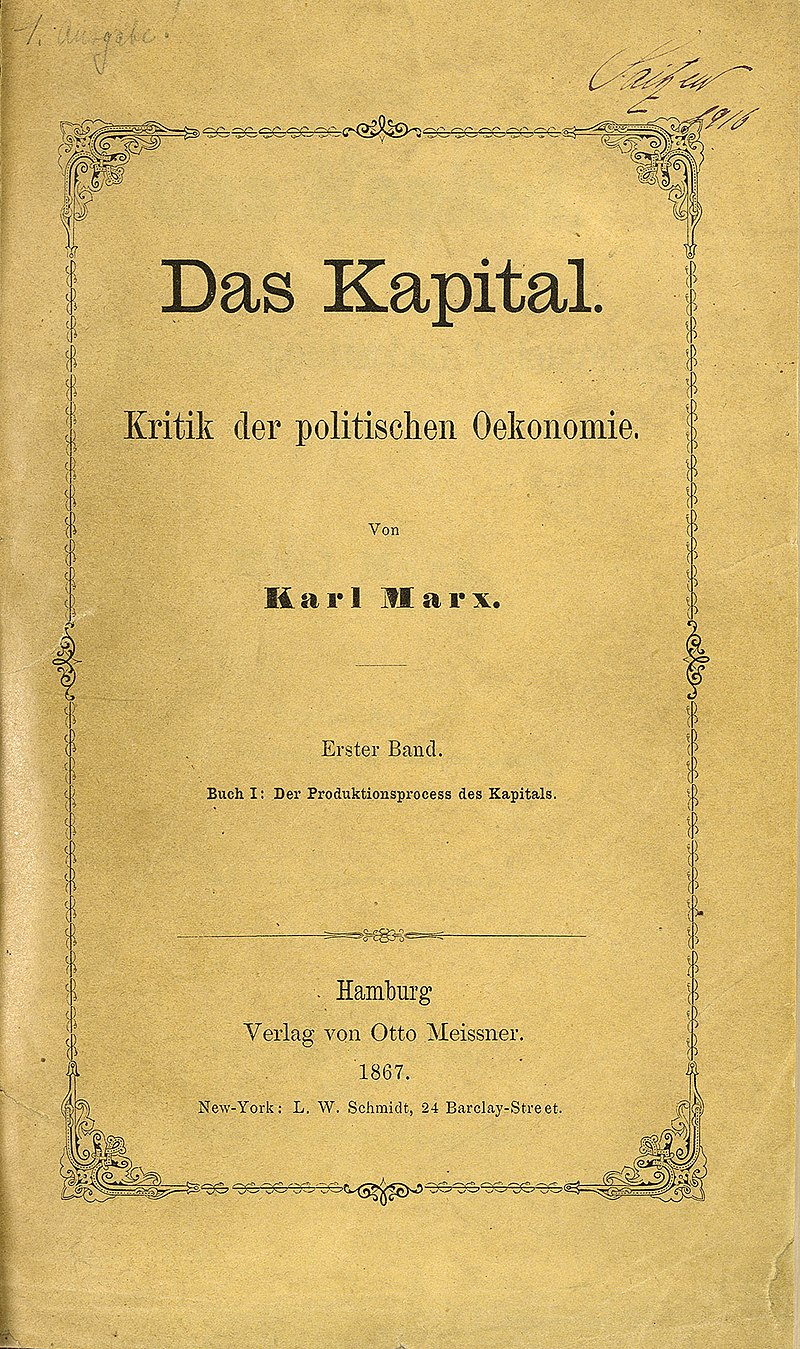

Copyleft,
CC, Mitzub'ixi Quq Chi'j, 1996-2099